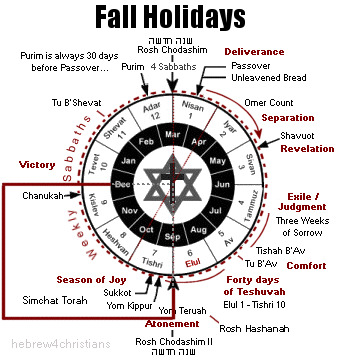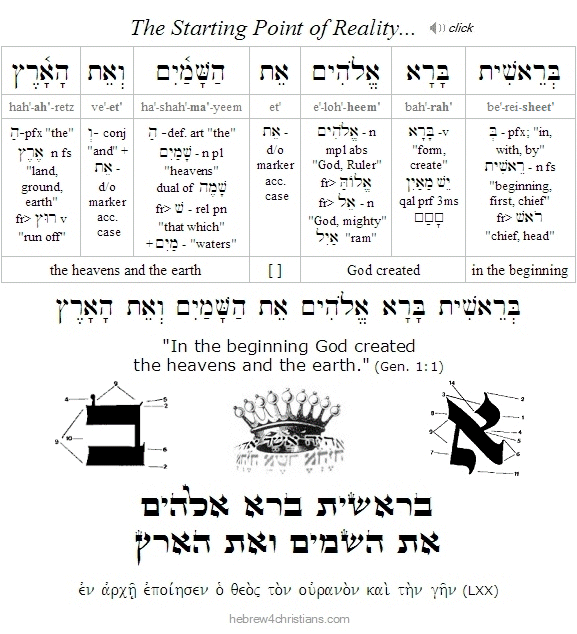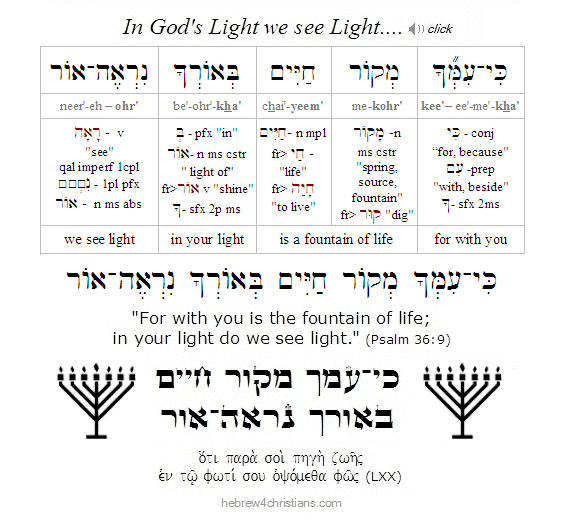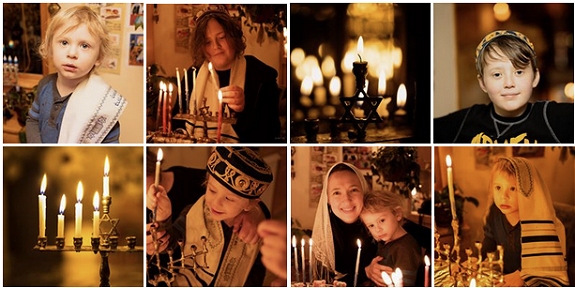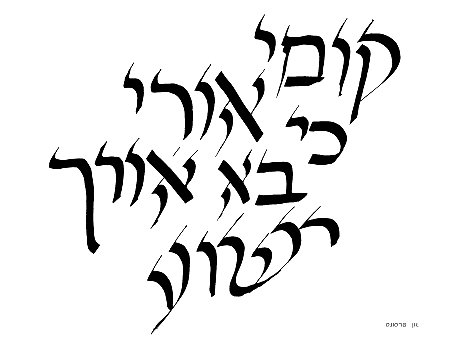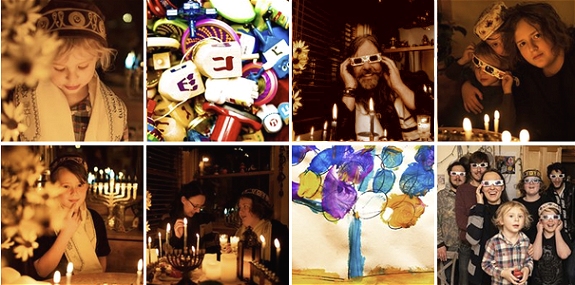|
Jewish Holiday Calendar
For December 2018 site updates, please scroll past this entry....
The Jewish civil year begins in the fall, though the Biblical year begins in spring (Exod. 12:2). Preparations for the fall holidays begin with a thirty day period of teshuvah (repentance) during the (late summer) month of Elul. The following ten days begin with the Feast of Trumpets (i.e., Yom Teruah or "Rosh Hashanah," on Tishri 1) and end with the Day of Atonement (i.e., Yom Kippur, on Tishri 10). These first ten days of the new year are called the "Ten Days of Awe" (i.e., aseret ye'mei teshuvah: עֲשֶׁרֶת יְמֵי תְּשׁוּבָה), or simply the Jewish "High Holidays." Just five days after the solemn time of Yom Kippur begins the joyous week-long festival of Sukkot ("Tabernacles"), which is immediately followed by the celebration of Simchat Torah. The holiday of Chanukah occurs in late fall and carries over to the winter season:
The Fall Holidays:

The fall festivals prophetically indicate the Day of the LORD, the second coming of Yeshua, the great national turning of the Jewish people, and the establishment of the reign of the Messiah upon the earth during the Millennial Kingdom in the world to come.
Note that in accordance with tradition, holiday dates begin at sundown. Moreover, some holidays may be postponed one day if they happen to fall on the weekly Sabbath:
- Month of Tishri (Sun. Sept. 9th [eve] - Mon. Oct. 8th [day])
- Month of Cheshvan (Mon. Oct. 8th [eve] - Wed. Nov. 7th [day])
- Four Sabbaths: Noach, Lekh-Lekha, Vayera, Chayei Sarah
- Yom Ha'Aliyah - Honoring Israel's immigrants (Mon. Oct. 15th; Cheshvan 7)
- Sigd - 50th day after Yom Kippur; Ethiopian Jewish holiday (Tues. Nov. 6th)
- Month of Kislev (Wed. Nov. 7th [eve] - Fri. Dec. 7th [day])
- Four Sabbaths: Toldot, Vayetzei, Vayishlach, Vayeshev
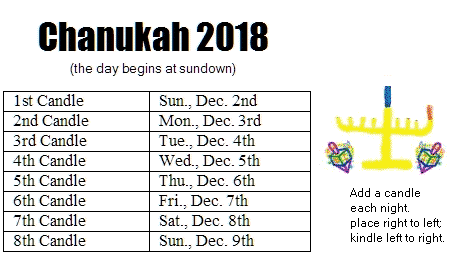
- Dates for Chanukah 2018 (5779):
- 1st Chanukah candle - Sun. Dec. 2nd [i.e., Kislev 25]
- 2nd Chanukah candle - Mon. Dec. 3rd
- 3rd Chanukah candle: Tues. Dec. 4th
- 4th Chanukah candle: Wed. Dec. 5th
- 5th Chanukah candle: Thurs. Dec. 6th
- Month of Tevet (Fri., Dec. 7th [eve] - Fri. Jan. 27th [day])
- Four Sabbaths: Miketz, Vayigash, Vayechi, Shemot
- Dates for Chanukah (continued):
- 6th Chanukah candle: Fri. Dec. 7th (Rosh Chodesh Chanukah)
- 7th Chanukah candle: Sat. Dec. 8th
- 8th Chanukah candle: Sun. Dec. 9th [Zot Chanukah]
- Tenth of Tevet - Tues. Dec. 18th, 2018; fast over the seige of Jerusalem
- Winter Solstice: Fri. Dec. 21st (Tevet 13)
- Christmas: Tues. Dec. 25th (Tevet 16, 5779)
- Secular New Year: Tues. Jan. 1st, 2019 (Tevet 24, 5779)
 |
Note: For more about the dates of these holidays see the Calendar pages....
December 2018 Updates
Note: If any page content appears to be missing, click: refresh the page...
Knowing the Savior...
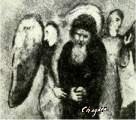
12.31.18 (Tevet 23, 5779) What was the reason for Abraham's dark vision (Gen. 15:12-15) and the subsequent exile of his children in Egypt – their persecution and suffering – were it not to experience redemption and receive the sacred duty to redeem others from bondage to evil? The deliverance from Egypt led directly to the revelation at Sinai. Therefore each of us is given shem ivri (עִבְרִישֵׁם), a "Hebrew name," when we cross over into the freedom we have in Yeshua. Indeed the New Testament says that the "Torah of Messiah" (תּוֹרַת הַמָּשִׁיחַ) is to bear one's another's burdens (Gal. 6:2).
In this connection the classical sages discuss whether or not it is possible to experience new revelation apart from the withdrawal (or transcendence) of a former revelation, and they suggest that God "withdrew" from the children of Israel in Egypt so that they could come to know him as YHVH – the Compassionate and Faithful One. God had to locate the people in Egypt – "be'mitzrayim" – a place of inescapable bondage – in order to remove them from it. That is why God began his message to Moses saying. "I AM YHVH" (אֲנִי יהוה), I appeared to Abraham, to Isaac, and to Jacob, as El Shaddai (בְּאֵל שַׁדָּי), but by my name the LORD (יהוה) I did not make myself known to them" (Exod. 6:2-3). God "appeared" to the fathers as the source of their promises, but the children of the Exodus generation were to be given new revelation of God's faithful love and deliverance...
The statement: "I will take you to be my people, and I will be your God, and you shall know that I am the LORD your God who has brought you out from under the burdens of the Egyptians" (Exod. 6:7) plainly states the goal of the redemption is to be brought into relationship with God as your personal Savior... This is the "love story" of the Exodus.
Deliverance from Ourselves...

12.31.18 (Tevet 23, 5779) From our Torah portion for this week (Va'era) we read, "Pharaoh's heart was hardened (וַיֶּחֱזַק) so he would not listen..." (Exod. 8:19). The worst kind of bondage is when you are oppressed by yourself - when you are so enslaved by your inner urges that you are no longer able to think outside of your desire or to choose to do otherwise... It might be greed, the desire for pleasure, fear, anger, or the "need" to be right (i.e., pride), but whatever controls you is ultimately your taskmaster. Ironically, Pharaoh's will to enslave the Israelites made him into a slave...
Self-deception can entice us to deny the consequences of our passions or to rationalize them by pretending we are victims. Because of this, we may become further enslaved to our own sense of self-importance, and we become ensnared within the prison house of the all-demanding ego. We can only be delivered from the "tyranny of ourselves" by God's power, as Yeshua said: "you will know the truth, and the truth will set you free" (John 8:32). This is the truth of God's power of deliverance given in Yeshua our Lord (Rom. 1:16; 1 Cor. 1:18). The truth sets you free not merely in some intellectual sense (i.e., being made free from error), but in a volitional sense, in the core of your being, when your will is no longer enslaved to the power and inner darkness of sin... May God help us be free!
Knowing the Name...
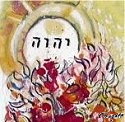
[ The following is related to our Torah reading for this week, Parashat Va'era... ]
12.31.18 (Tevet 23, 5779) From our Torah portion this week we read that God said to Moses: "I appeared (וָאֵרָא) to Abraham, Isaac, and Jacob as El Shaddai (אֵל שַׁדָּי), but by my name the LORD (יהוה) I did not make myself known to them" (Exod. 6:3). Here we are faced with a puzzle, since the Torah clearly states that God revealed Himself as YHVH to the patriarchs. For example, to Abraham God said, "I am the LORD (אֲנִי יְהוָה) who brought you out of Ur of Kasdim" (Gen. 15:7), and to Jacob he said: "I am the LORD (אֲנִי יְהוָה), the God of Abraham your father and the God of Isaac (Gen. 28:13). In light of this, how then do we make sense of God's statement that He was not known as YHVH to the patriarchs?
The traditional explanation is that God was stating that the patriarchs had not directly experienced His mastery over creation through the signs and wonders He would perform as Israel's Savior and Redeemer. The patriarchs understood God as El Shaddai (אֵל שַׁדַּי), the all-sufficient One who nurtured the fledgling nation and who foretold Israel's future (Gen. 17:1-2; 28:3; 35:11), but Moses (and the Israelites) would now know God's attributes of covenantal faithfulness (chesed) as the "Promise Keeper" by directly witnessing his saving acts. Indeed, the Name YHVH implies that God is the Faithful One, since the name is formed by permutating the letters of the Hebrew root "to be": hayah (was), hoveh (is), and yihey (will be), which implies there is no power that can prevent God from fulfilling His promises. YHVH is Lord of lords and King of kings whose word can never fail (Deut. 10:17; Dan. 2:47). Ein od milvado (אֵין עוֹד מִלְבַדּו): "there is no truth apart from Him" (Deut. 4:35,9).
The name "ehyeh asher ehyeh" (אֶהְיֶה אֲשֶׁר אֶהְיֶה) means "I shall be as I shall be," that is, "I shall be with those who desire that I shall be with them. I reveal myself to those who seek for me, and as I am sought, so I will be found. According to your faith be it done unto you: Blessed are they that hunger and thirst for righteousness, for they shall be filled..."
For more on this subject, see the article: Yeshua and YHVH.
Note: The question of the Name of God is raised both in last week's Torah portion (Shemot), where Moses asked God's Name to validate his mission to Israel, and again in this week's portion (Va'era), where God made the puzzling statement that the patriarchs did not know God's Name as YHVH (יהוה). The entire question of God's name resolves to be a question about our ability to understand the very heart of God more than anything else (it's a matter of Who, not What). This is demonstrated by the fact that the name YHVH (יהוה) was revealed yet again to Israel only after the sin of the Golden Calf, when Moses learned that it meant Compassion and Grace (see Exod. 34:6-7). This second revelation of the Name foreshadowed the New Covenant to come. Indeed the full meaning of God's name was revealed in the last gasp of Yeshua as He died upon the cross for our atonement: ἐξέπνευσεν - "he breathed out," the great exhalation of all that he came to be for us... (Mark 15:37).
Truth sets you free...
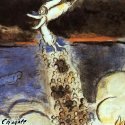
12.31.18 (Tevet 23, 5779) When Yeshua said that the truth would "set us free" (ἐλευθερώσει), he was referring to the acceptance of the Witness of Divine Reality (i.e., the Word, Breath, Spirit, Voice, Message, Meaning, and Love of God) that delivers us from the lies we habitually tell ourselves. If you "persevere in my word" (μείνητε ἐν τῷ λόγῳ τῷ ἐμῷ) he said, "then you are my disciples indeed, and you will know the truth, and the truth will set you free" (ἡ ἀλήθεια ἐλευθερώσει ὑμᾶς, John 8:31-32). In other words, as we identify with his vision and redemptive mission, we will "be free indeed" from the tohu va'vohu (Gen. 1:2) – the "chaos and unreality" – that inescapably besets the way of the lie... We will be delivered from vanity and delusions of this world and its diseased affections; we will be set free from the need to justify ourselves by religion (perfectionism); we will no longer crave other people's approval; we will not be moved by the crowd and its pressures; we will find courage to face our challenges without resorting to escapism; and we will learn how to experience peace even when we encounter frustrations. Despite our daily struggles and tests, we will be released from bondage to anger and resentment as we yield our will in trust that God is working all things together for our ultimate good (Rom. 8:28). Genuine freedom is not an "accidental property" of the heart, depending on "luck" or "fortune," but instead is a decision to believe in the Reality of the salvation of God given in Yeshua our LORD.
Redeeming the Time...
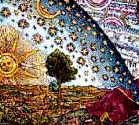
12.30.18 (Tevet 22, 5779) "Teach us to number our days, that we may apply our hearts unto wisdom" (Psalm 90:12). Each soul is given a finite amount of time in this world, and therefore Moses asked God to teach us how to live in light of our ultimate end... For this we need wisdom, which primarily consists of knowledge of the holy (דַעַת קְדשִׁים) and the experience of the awe of the LORD (יִרְאַת יְהוָה, Prov. 9:10). Note then the connection between learning to "number our days" and apprehending the sacredness of life. As we learn to esteem our days, so we discover wisdom for our sojourn to eternity. Reflecting on the brevity of life awakens us to consciously reflect upon the course of our lives and to distill the ultimate concerns of our hearts. After Adam sinned in the Garden, he vainly tried to hide himself until he heard the Voice of God calling out: אַיֶּכָּה - ayeka? – "Where are you?" That is the question for each soul as we learn to discern the direction of our lives. Where are you today, and where are going? Our days are numbered, friend, and it is of utmost importance to apply our hearts unto wisdom while we still have the time and strength to do so. "No one knows the day or hour..." May God help us to learn how to make our days count for eternity, to have a weight of glory that will shine in the world to come. Amen.
לִמְנוֹת יָמֵינוּ כֵּן הוֹדַע
וְנָבִא לְבַב חָכְמָה
lim·not · ya·me·nu · ken · ho·da
ve·na·vi · le·vav · chokh·mah

"Teach us to number our days
that we may apply our hearts unto wisdom."
(Psalm 90:12)

Hebrew Study Card
Notwithstanding the frailty and brevity of our days, may it please God to shine the power of His radiance upon us and to establish our works for His praise: "May the beauty of the LORD our God be upon us and establish the work of our hands upon us; yes, establish the work of our hands" (Psalm 90:17). May the LORD our God teach us to "number our days" so that we may obtain levav chokhmah (לְבַב חָכְמָה) - a heart of wisdom to live according to His will (James 1:5). And above all else, may the "God of our Lord Yeshua the Messiah, the Father of Glory (אֲבִי הַכָּבוֹד), impart to you a spirit of wisdom and of revelation in the knowledge of Him, having the "eyes of your hearts" (ὀφθαλμοὺς τῆς καρδίας) enlightened, that you may know what is the hope to which he has called you" (Eph. 1:17-18). May you be strong, resolute, and fully focused on our LORD, chaverim. Amen.
New Year Assumptions...

12.30.18 (Tevet 22, 5779) Often we don't realize what is not being said because of what is being said. In other words, hidden or unspoken assumptions are always at work in communication, though we rarely take the time to examine these assumptions for ourselves. Advertisers, politicians, and others who wish to control your thinking implicitly understand this and therefore regularly employ various techniques to distract you from examining their assumptions. They understand that the louder (or more frequently or more threateningly) something is said, the less likely you will question its truth status or engage in reasonable thinking of your own.... In other words, "truth" for such pragmatists is little more than persuasion. Get the crowd to believe you and you've got the "truth."
For example, in most countries of the world, "New Year's Day" is usually celebrated (usually as a "carnival" or revelry) on January 1st, though this date comes from the arbitrary decree of the consuls of ancient (and pagan) Rome -- certainly not from anything taught in the Torah and the Hebrew Scriptures. According to Torah, however, there are two mirroring "New Years" observed during the year. The first occurs two weeks before Passover (Nisan 1) and the second occurs ten days before Yom Kippur (Tishri 1). The first is called Rosh Chodashim (see Exod. 12:2), which commemorates the month of the redemption of the Jewish people (i.e., the month Yeshua was sacrificed for our sins), whereas the second is called Yom Teru'ah that is associated with the "Feast of Ingathering" at the "end of the year" (Exod. 23:16, 34:22). Later Yom Terua'h became known as Rosh Hashanah ("the head of the year") which began a ten-day "trial" of humanity climaxing on the Day of Atonement (Yom Kippur).
The two "new years" of the Jewish calendar mirror each other and reveal the two advents of Messiah. For more on the secular New Year and its relationship to the calendar of Torah, see the page, "The Gregorian Calendar and Pagan Assumptions."
Parashat Va'era - וארא

12.30.18 (Tevet 22, 5779) Last week's Torah portion (Shemot) told how Moses and Aaron were commissioned to go before Pharaoh and deliver the God's message: Shelach et ami (שַׁלַּח אֶת־עַמִּי), "let my people go, that they may hold a feast to me in the desert." Not only did Pharaoh dismiss the request, he imposed even harsher decrees against the Israelites and caused them to suffer miserably. Moses then appealed to the LORD, who reassured him that Pharaoh would eventually relent because of "the greater might" of God's power to deliver His people....
In this week's portion (Va'era), the LORD told Moses that He was now going to fulfill His promise to Abraham, Isaac, and Jacob by giving the Israelites the land of Canaan, and that he had heard the "groaning of the people of Israel whom the Egyptians held as slaves" (Exod. 6:5). The showdown between the LORD (יהוה) and the so-called gods of Egypt was imminent, and God therefore encouraged the people with precious promises: "I AM the LORD (אֲנִי יְהוָה) and I will bring you out from under the burdens of the Egyptians, and I will deliver you from their bondage, and I will redeem you with an outstretched arm and with great judgment; and I will take you to me for a people and I will be to you a God" (these are the "four expressions of redemption" we recite during the Passover Seder every year).
Despite these wonderful promises, however, the people were unable to listen because of their "shortness of breath" (מִקּצֶר רוּחַ) on account of their harsh slavery. The LORD then told Moses: "Go in, tell Pharaoh king of Egypt to let the people of Israel go out of his land," and the great showdown between the LORD and the gods of Egypt began. However, even after repeatedly witnessing the series of miraculous plagues issued in the Name of the LORD, the despot remained proud and unmoved, thereby setting the stage for the final devastating plagues upon the land of Egypt and the great Passover redemption of Israel.
Shalom and good upon you... Shanah tovah and may we all have great joy and strength as we continue reading a Sefer Shemot for this week. Amen.
Rosh Chodesh Shevat

12.30.18 (Tevet 22, 5779) Note that this coming Sunday, January 6th, 2019 marks Rosh Chodesh Shevat (חדש שבט), that is, the eleventh month of the Jewish calendar (counting from the month of Nisan). Shevat is considered important because Moses began his summary of the Torah (i.e., Mishneh Torah, or the sermon recorded in Book of Deuteronomy) on the first day of this month (Deut. 1:1,3). Because of this, the sages have long associated the Rosh Chodesh Shevat with the holiday of Shavuot (i.e., the sixth of Sivan), since on both these dates God appealed to Israel to receive the message of the Torah. The month of Shevat is also important because the "Rosh Hashanah for Trees" occurs on the 15th of the month (i.e., Tu B'Shevat).
Moses and the Messiah...

[ The following is related to our Torah reading for this week, Parashat Shemot... ]
12.28.18 (Tevet 20, 5779) Like Joseph before him, Moses was a "picture" of Yeshua in various ways. Though he was an Israelite from the tribe of Levi, he appeared as a "prince of Egypt" to his own people and was educated in all the wisdom of the Egyptians (Acts 7:22). And though he was God's chosen deliverer, Moses was initially rejected by the Israelites and then turned to the Gentiles, taking a "foreign" bride. After being severely tested in the desert, he was empowered by God's Spirit to become Israel's deliverer for their hour of great tribulation. Indeed, both Moses and Yeshua were "sent from a mountain of God" to free Israel. Both revealed the meaning of God's Name; both spoke with God "face to face." Moses was sent from (physical) Mount Sinai in Midian; Yeshua was sent from a spiritual "Mount Zion" in Heaven (Heb. 12:22). The New Testament relates that Moses and Elijah later met with Yeshua to discuss His "departure," literally, "His Exodus" (τὴν ἔξοδον αὐτοῦ) that he would accomplish at Jerusalem to redeem the entire world (Luke 9:30-31).
Note: For a more comprehensive list of the various correspondences between Moses and Yeshua, see the article, "Moses' Prophecy of the Messiah." Shabbat Shalom!
Celebrate God's Love...

12.28.18 (Tevet 20, 5779) Yeshua said the kingdom of heaven could be likened to a king who gave a wedding feast for his beloved son. Those who were invited made one excuse after another why they could not attend, so the disappointed king then instructed his servants to "go out quickly to the streets and lanes of the city, and bring in the poor and crippled and blind and lame... and compel everyone you find to come in, so my house may be filled." God loves people and implores them to personally join in the celebration of his love, to partake of the marriage feast of Lamb (Rev. 19:7). But note this means that we are to bring all the lame, broken, and fearful parts of ourselves to the banqueting table of God's love... The courage to "come to the table" only comes from a sense of being welcomed and accepted, that is, by trusting that you are truly made safe by God's love....
Perhaps we are suspicious of God's unconditional love for us because we've experienced rejection or abandonment in our lives. We silently wonder, "What if God lets me down and I get hurt again?" We prefer the "comfort" of our fears to the risk of letting go and trusting in God's love for us, just as we are... This fear shows up in a lot of ways, for instance, by thinking we have to be "religious," or by attempting to clean ourselves up before we can accept God's love, On the other hand, we might entertain a sense of false humility that considers our sin to be too much for God to bear, and thereby excuse ourselves from the celebration.... In every case the problem is the need to control. We want to define the terms of love before we will let go and trust. We are offended at the idea of divine grace because we want to esteem ourselves as worthy of God's love based on who we are, rather than on who God is... The message of God's love, however, is scandalous, precisely because it gives wholeheartedly to those who are undeserving and unworthy, to the tax collectors, the sinners, the crippled and blind and lame...
But there is another aspect to this invitation we should consider, too. Yeshua repeatedly used this parable in his teaching (see, for example, Luke 14:16-24, Matt. 22:1-14). In the Matthew account, the only person rejected from the celebration was the one who attended without the royally provided "wedding garment," indicating a person who came apart from trusting in God's "imputed righteousness" freely bestowed in Messiah... The wedding feast is for all to come, but those who come clothed in their own "robes of righteousness" will find nothing to celebrate, after all (Isa. 64:6).
"And he said to him (i.e., to the one without the garment provided by the king), 'Friend (ἑταῖρε - a word of politeness but without warmth), how did you get in here without a wedding garment?' And he was speechless" (Matt. 22:12). Indeed, no right word can be uttered against the reality and truth of God's love in Messiah. "How did you come in here, apart from being robed in the righteousness of God that comes through faith in the work of Messiah?" This presumptuous guest came his own way, still wearing the trappings of the old nature, still at enmity with the Spirit of truth, still wearing some "self-styled" religious costume, still preaching some false gospel of self-justification, and thereby refusing the principle of the "exchanged life" given in Messiah. But like Aaron's sons Nadab and Abihu, this man was exposed by his own presumption before the presence of the King himself, and indeed, the moral of the story is that those who pretend they can come to God apart from the saving love of Yeshua will find themselves (chas v'chalila) cast outside, weeping in outer darkness (Matt. 22:13; Heb. 10:31).
God Knows your Name...

12.28.18 (Tevet 20, 5779) The Book of Exodus begins, ve'eleh shemot (וְאֵלֶּה שְׁמוֹת), "and these are the names" (of the sons of Israel). God call each person by name to make the journey... Indeed, God calls each star by its own name (Gen. 22:17, Psalm 147:4) and yet He also knows each lily of the field and sparrow that flutters its wings (Matt. 6:28-30, 10:29). As Yeshua said, even the hairs on your head are all numbered (Matt. 10:30). In Jewish theology, the term hashgachah pratit (הַשְׁגָּחָה פְּרָטִית) refers to God's personal supervision of our lives (hashgachah means "supervision," and pratit means "individual" or "particular"). Since God is the Master of the Universe, His supervision and providence reaches to the smallest of details of creation - from subatomic particles to the great motions of the cosmos. Of particular interest, however, are those whom He created be'tzelem Elohim: in His image and likeness. The LORD is called אלהֵי הָרוּחת לְכָל־בָּשָׂר / Elohei ha-ruchot lekhol-basar: "The God of the spirits of all flesh" (Num. 16:22), and that means that every spirit ultimately answers to Him.
אִם־יִסָּתֵר אִישׁ בַּמִּסְתָּרִים
וַאֲנִי לא־אֶרְאֶנּוּ נְאֻם־יְהוָה
הֲלוֹא אֶת־הַשָּׁמַיִם וְאֶת־הָאָרֶץ
אֲנִי מָלֵא נְאֻם־יְהוָה
im · yis·sa·ter · ish · ba·mis·ta·rim
va·ani · lo · er·en·nu · ne·um · Adonai
ha·lo · et · ha·sha·ma·yim · ve·et · ha·a·retz
a·ni · ma·lei · ne·um · Adonai

"Can a man hide himself in secret places
so that I cannot see him? declares the LORD.
Do I not fill heaven and earth?
declares the LORD." (Jer. 23:24)

We find great comfort when we understand that God has complete authority over categorically everything in the universe -- including our ultimate welfare (John 10:27-28). When we pray to the LORD God of Israel, we intuitively understand that He is completely sovereign and Lord over all things... All power, glory, authority, and dominion is His alone, and all that is in the heaven and in the earth is His (1 Chron. 29:11-12). We do not worry that He is incapable of handling our troubles or that He is unable to help us. No, we acknowledge that the God most High (אֵל עֶלְיוֹן) sustains all things by the Word of His power (Col. 1:17). He is "the blessed and only Sovereign, the King of kings (מֶלֶךְ הַמְּלָכִים) and the Lord of lords" (1 Tim. 6:15). Whenever we think clearly in light of the revelation of Scripture, we apprehend the truth about God's sovereign glory and power...
Greatness of Moses...
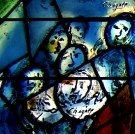
12.28.18 (Tevet 20, 5779) From our Torah portion this week (Shemot) we read: "when Moses grew up, he went out to his people and looked on their burdens" (Exod. 2:11). The sages say, "do not read, 'grew up,' but rather 'became great'" (וַיִּגְדַּל), since Moses exiled himself by opening his eyes to his people's suffering. Indeed Moses was made great as he emptied himself of his royal privilege and identified with the pain and misfortunes of others (Phil. 2:7). As is written: "By faith Moses was made great (μέγας γενόμενος) by refusing to be called the son of Pharaoh's daughter, choosing rather to be mistreated with the people of God than to enjoy the fleeting pleasures of sin" (Heb. 11:24-25).
"When Moses grew up, he went out to his people and looked on their burdens" (Exod. 2:11). Regarding this verse the great Torah commentator Rashi wrote, "Moses set his eyes and heart to feel their anguish." The midrash says that when Moses saw the hard labor of the people, he took their yoke upon him. Indeed some of the earlier sages said that sharing the burden of another is the essence of Torah, the very foundation of all heavenly obligation (Avot 6:6). Therefore the Apostle Paul wrote (Gal. 6:2): "Bear one another's burdens, and so fulfill the Torah of the Messiah (תּוֹרַת הַמָּשִׁיחַ)." Expressing empathy by identifying with the pains of others requires bittul hayesh (בִּטּוּל הַיֵּשׁ), or the setting aside of the ego, which is also the essential requirement for revelation from heaven. Hence Moses was given direct encounter with the Divine Presence because of his great humility.
In order to say, "thy kingdom come, thy will be done" you must let go of your own agenda; your ego must be deposed from its petty little kingdom... Likewise, you can't say, "Come, Lord Jesus" by putting your fear first, or by otherwise demanding that your life should center on your own personal "advent." No, you must consciously choose to live in exile to this world (Gal. 6:14). How can we ever expect the LORD to live out His life through us if we do not genuinely offer our lives to Him? And yet this is exactly the problem of the ego...
A principle of spiritual life is that we descend in order to ascend, or the "the way up is the way down." As Yeshua said, "Whoever would be first among you must be slave of all" (Mark 10:44). Becoming nothing (i.e., ayin) in this world is the condition for seeing something in the world to come. But we become nothing by trusting in the miracle, not by trying to efface ourselves... This is not another venture of the ego. Life in the Spirit means trusting that God will do within you what you cannot do for yourself... We can only take hold of what God has done for us by "letting go" of our own devices (Phil. 2:13). When we really let go and trust, we will become nothing (i.e., klume: כְּלוּם), carried by the Torah of the Spirit of life. The way is not trying but trusting; not struggling but resting; not of clinging to life, but of letting go...
"So-called pious people are unfree. They too lack the authentic certitude of inwardness. That is why they are so pious! And the world is surely justified in laughing at them. If, for example, a bowlegged man wants to be a dancing master but is not able to execute a single step, he is comical. So it is also with the multitudes who are so religious. Often you can hear the pious beating time, as it were, exactly like one who cannot dance but nevertheless knows enough to beat time, yet who are never fortunate enough to get in step. In order to reassure themselves, the pious seize upon grandiose ideas that the world hates. They battle ideas, but not with their lives. Such is the life of those who lack inwardness." - Kierkegaard (Journals)
Note: This is another example of the difficulty of truly trusting God for the miracle, of receiving the miracle... Some people scorn the idea of "easy believism," though of course there is nothing at all "easy" about exercising true faith in the LORD and living the truth in our lives. We need the miracle; we need grace from heaven to impart real passion for us to walk according to God's heart.
The Troubles of Love...

[ The following is related to our Torah reading for this week, Parashat Shemot... ]
12.28.18 (Tevet 20, 5779) People tend to believe what they want to believe until they are faced with reality, and therefore God orchestrates tests and challenges to awaken people from their illusions to make them confront their need for deliverance. Such afflictions are called yissurim shel ahavah, "troubles of love." Thus we read in our Torah how the people groaned because of their slavery and then cried out to heaven for help: "And God heard their groaning; he remembered his covenant ... and God saw the people of Israel, and God knew" (Exod. 2:24-25). Note the pattern: The people cried out for help; God heard (וַיִּשְׁמַע); he remembered (וַיִּזְכּר), he saw (וַיַּרְא); and he knew (וַיֵּדַע)... God knows our profound need for Him. Affliction teaches us that wishful thinking is unable to sustain the weight of reality, and only God Himself can truly save us...
Where it says, "How long shall I take counsel in my soul, having sorrow in my heart daily" (Psalm 13:2), the sages remark that just as long as we take counsel in our own soul there will be despair, since only after we realize that no further counsel can help us do we give up and confess our need for God's salvation. Therefore בְּטַח אֶל־יְהוָה בְּכָל־לִבֶּךָ, "trust in the LORD with all your heart, and do not lean on your own understanding" (Prov. 3:5).
Moses' Thorn in the Flesh...
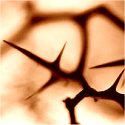
12.28.18 (Tevet 20, 5779) When God commissioned him to speak to the children of Israel, Moses protested to the LORD that he was kevad peh - "heavy of mouth" and kevad lashon, "heavy of tongue," and therefore unfit to speak on behalf of the LORD (Exod. 4:10). God then reminded him that He was the Creator of the mouth: "Who makes him mute, or deaf, or seeing, or blind? Is it not I, the LORD?" Now therefore go, and I will be with your mouth and teach you what you shall speak" (Exod. 4:11-12). According to many of the classical Jewish commentators, God did not cure Moses of his stuttering because He wanted the Israelites to know that he was a divine messenger. When he spoke in the Name of the LORD, the stuttering entirely disappeared and Moses spoke with fluent ease. This was to teach the people not to trust in human oratory or wisdom, but rather in the power of God (see 1 Cor. 2:1-5). Just as the Apostle Paul, the "Moses of the New Covenant," was given a "thorn in the flesh" (σκόλοψ τῇ σαρκί) to keep him humbly relying upon God for his sufficiency to serve (2 Cor. 12:7-10), so Moses was rendered entirely dependent upon the LORD but thereby became a "man of words" who spoke with "circumcised lips."
Man of Sorrows...
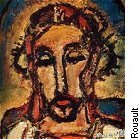
[ The following is related to our Torah reading for this week, Parashat Shemot... ]
12.27.18 (Tevet 19, 5779) The LORD said, "I have surely seen the affliction of my people who are in Egypt and have heard their cry... I know their sorrows" (Exod. 3:7). The grammar here is intense: "seeing I have seen" (רָאה רָאִיתִי). Understand, then, that God surely sees your struggles, friend. Second, know that God heeds the outcry (צְעָקָה) of your heart, and indeed, he interprets your groaning as if it were for the sake of serving him. Your heart's cry is transformed by grace to be the cry for God himself, for relationship with Him. "The cry of the people has come to me," he told Moses (Exod 3:9), which means all the sufferings, the wrongs, the hopes, the fears, the groans, the despair, the prayers, were present before him, as if he counted every word and sigh. Third, realize that God knows your sorrows; he gathers all your tears into his bottle (Psalm 56:8). The word translated "sorrows" (מַכְאב) is the same used to describe the "Man of sorrows" (אישׁ מַכְאבוֹת), Yeshua our Suffering Servant, who gave up his life to deliver you from darkness, sorrow, and fear (Isa. 53:3-5).
"If there is anywhere on earth a lover of God who is always kept safe from falling, I know nothing of it, for it was not shown to me. But this was shown - that in falling and rising again we are always kept in that same precious love. Between God and the soul there is ultimately no between." - Julian of Norwich
Being and Truth...

[ The following is related to our Torah reading for this week, Parashat Shemot... ]
12.27.18 (Tevet 19, 5779) In our Torah portion this week, Moses asked for God's Name, and God then said ehyeh asher ehyeh (אֶהְיֶה אֲשֶׁר אֶהְיֶה), "I AM that I AM" (or "I will be what I will be"), abbreviated simply as ehyeh (אֶהְיֶה), "I AM" (Exod. 3:14). Note that God identifies himself with being itself, since ehyeh is the Qal imperfect form of the verb hayah (הָיָה), meaning "to be." Indeed, the Name YHVH (יהוה) essentially means "Presence," since God is called ha-hoveh, ve'hayah, ve'yavo (הַהוֶה וְהָיָה וְיָבוֹא) - "the One who is, and was, and is to come" (Rev. 4:8). This "threefold Name" of the LORD of Hosts encompasses all possible states of being, indicating that God is LORD over all possible worlds...
וַיּאמֶר אֱלהִים אֶל־משֶׁה אֶהְיֶה אֲשֶׁר אֶהְיֶה
וַיּאמֶר כּה תאמַר לִבְנֵי יִשְׂרָאֵל
אֶהְיֶה שְׁלָחַנִי אֲלֵיכֶם
va·yo·mer · E·lo·him · el · Mo·she · eh·yeh · a·sher · eh·yeh
va·yo·mer · koh · to·mar · liv·nei · Yis·ra·el
eh·yeh · she·la·cha·ni · a·le·khem

"God said to Moses, "I AM WHO I AM."
And he said, "Say this to the sons of Israel,
'I AM has sent me to you'" (Exod. 3:14)

Download Study Card
Note further that the Name YHVH (יהוה) is to be forever identified as "the God of Abraham, the God of Isaac, and the God of Jacob" (אֱלהֵי אַבְרָהָם אֱלהֵי יִצְחָק וֵאלהֵי יַעֲקב), as clearly stated by God in the immediately following verse (see Exod. 3:15). This should quiet the minds of those who are troubled with determining or pronouncing "YHVH," since the Source of Life, the Creator and Redeemer of life, is clearly to be known as "the God of the fathers" of the Jewish people, as Yeshua our LORD also taught (John 4:22).
The Book of Exodus...
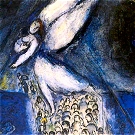
12.27.18 (Tevet 19, 5779) Over the next several weeks (until the middle of March, 2019) we will be reading and studying the Book of Exodus (סֵפֶר שְׁמוֹת) and considering its message in light of revelation of Yeshua our Messiah (there are forty chapters in this book that are traditionally divided into eleven weekly Torah readings). Some of the greatest narratives of all the Scriptures are found in this amazing book, including the Israelites' enslavement and subsequent deliverance with the ten plagues by the hand of the LORD. After the great Passover, Moses led the people out of the land Egypt, crossing the Sea of Reeds, and arriving at Sinai to receive the Torah exactly 49 day later. While Moses was on the mountain, however, the people worshipped a Golden Calf, and a long period of repentance occurred until the covenant was reestablished. The remainder of the book describes the vision and construction of the Mishkan (Tabernacle) -- the great Altar upon which a defect-free lamb was offered every day and every night...
In English the word "Exodus" ("going out") comes from the title of the ancient Greek translation of the phrase Sefer Yetziat Mitzraim ("the book of the going out from Egypt"). Hence the Greek word ἔξοδος became "Exodus" in Latin which later was adopted into English. In the Hebrew Bible this book is called Shemot ("names"), following the custom of naming a book according to its first significant word.
An Everlasting Love...

[ Some people seem to object to the idea of God's "unconditional love," perhaps because they fear that such love would negate moral responsibility, but is there really any other kind of real love? Genuine faith in God's love does not lead to moral nihilism but to worship and reverence... ]
12.27.18 (Tevet 19, 5779) It is repeatedly and emphatically stated in our Scriptures that "salvation is "of the LORD" (לַיהוָה הַיְשׁוּעָה); and that we are not saved "by works of righteousness (מַעֲשֵׂי הַצְּדָקָה) that we have done, but solely on account of the mercy given to us in God our Savior (אֱלהִים מוֹשִׁיעֵנוּ; Titus 3:4-5). Grace excludes all boasting (Eph. 2:9; Rom. 4:4). We believe that God justifies the ungodly (i.e., the powerless) by trusting in his heart of compassion (Rom. 4:1-8). God loves us with "an everlasting love" (i.e., ahavat olam: אַהֲבַת עוֹלָם) and draws us in chesed (חֶסֶד, i.e., His faithful love and kindness). As it is written: "I love you with an everlasting love; therefore in chesed I draw you to me" (Jer. 31:3). Note that the word translated "I draw you" comes from the Hebrew word mashakh (מָשַׁךְ), meaning to "seize" or "drag away" (the ancient Greek translation used the verb helko (ἕλκω) to express the same idea). As Yeshua said, "No one is able to come to me unless he is "dragged away" (ἑλκύσῃ) by the Father (John 6:44). God's chesed seizes us, scandalizes us, takes us captive, and leads us to the Savior... Spiritual rebirth is a divine act, "not of blood nor of the will of the flesh nor of the will of man, but of God" (John 1:13). In everything - including human reason itself - the LORD God Almighty is preeminent.
מֵרָחוֹק יְהוָה נִרְאָה לִי
וְאַהֲבַת עוֹלָם אֲהַבְתִּיךְ
עַל־כֵּן מְשַׁכְתִּיךְ חָסֶד
me·ra·chok · Adonai · nir·ah · li
ve·a·ha·vat · o·lam · a·hav·tikh
al · ken · me·shakh·tikh · cha·sed

"The LORD appeared to me from far away.
I have loved you with an everlasting love;
therefore with lovingkindness have I drawn you."
(Jer. 31:3)

Hebrew Study Card
There is only One who offers you life, peace, and eternal healing, but it is offered on his terms, not your own. He makes you lay down in pastures of tender grass, he leads you beside the place of quiet waters (עַל־מֵי מְנֻחוֹת). He calls to your heart: "Come unto me, all you that labor and are heavy laden, and I will give you rest. Take my yoke upon you, and learn of me; for I am gentle and humble in heart: and you shall find rest for your souls. For my yoke is easy, and my burden is light" (כִּי עֻלִּי רַךְ וּמַשָּׂאִי קָל) [Matt. 11:28-30]. Thank God for the gracious love of our Savior Yeshua!
Heart of the Fire...

12.26.18 (Tevet 18, 5779) In our Torah we read that the Angel of the LORD (מַלְאַךְ יהוה) appeared to Moses "in the flame of fire" from the midst the bush (Exod. 3:2). The Hebrew phrase "flame of fire" (בְּלַבַּת־אֵשׁ) can also be read as in the "heart of fire" (from לב, "heart"). What nourishes the flame is the heart of God as expressed through the Word of God saying: "I AM the God of your father, the God of Abraham, the God of Isaac, and the God of Jacob."
אָנכִי אֱלהֵי אָבִיךָ אֱלהֵי אַבְרָהָם
אֱלהֵי יִצְחָק וֵאלהֵי יַעֲקב
a·no·khi · e·lo·hei · a·vi·kha · e·lo·hei · Av·ra·ham
e·lo·hei · Yitz·chak · vei·lo·hei · ya·a·kov

"I AM the God of your father, the God of Abraham
the God of Isaac, and the God of Jacob"
(Exod. 3:6)
Learning from Waste Places...

[ Happy Holidays, chaverim! The following entry is related to this week's Torah reading (Parashat Shemot). Please read the Torah portion to "find your place" here. ]
12.25.18 (Tevet 17, 5779) Forty years before encountering the LORD in the burning bush, Moses was full of himself, a prince of Egypt "mighty in word and deed" who self-confidently regarded himself as Israel's "deliverer" (Acts 7:22-25). But Moses' "Egyptian-styled" ego led him to regard murder and human uprising as the means of deliverance, and consequently God sent him into exile to think things through... It was there, in the waste places of the desert, that Moses' education began - the school of brokenness, teshuvah, and heart-listening... Only after this did the LORD appear to him, calling out to the man who had lost all confidence in the flesh. Moses' humility mirrored the emptiness of the desert: "Who am I?" he protested, "I can't do this thing..." (Exod. 3:11). Exactly! Now he understood. Similarly, we must be careful not to regard ourselves as "strong," since the power of the flesh is useless for the purposes of heaven (Zech. 4:6). As it is written, "Thus says the LORD: 'Cursed is the man who trusts in man and makes flesh his strength, whose heart turns away from the LORD. He is like a shrub in the desert, and shall not see any good come. He shall dwell in the parched places of the desert, in an uninhabited salt land" (Jer. 17:5-6). It was only after Moses' question, "Who am I?" was answered by God's "I AM who I AM," that the "useless shrub" became aflame with God's power...
Moses' rod, which he had relied upon for years in the desert as a shepherd, was transformed to be used as an instrument of Divine Power (Exod. 4:1-5). God entrusts the rod of His authority only in the hands of a truly broken man.... Similarly, though Moses was described as a man "mighty in word and deed," these were attributes of the flesh unrefined by the Spirit of God. Therefore, after being humbled in the desert, Moses confessed that he was kevad peh - "heavy of mouth" and kevad lashon, "heavy of tongue," and unable to speak on behalf of the LORD. God then told him that He would "be with his mouth" to teach him what to say (Exod. 4:10-12). This likewise teaches that God entrusts the utterance of his word to the tongue of a genuinely broken man...
God's Name is Enough...
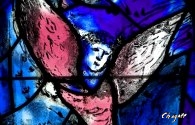
[ Merry Christmas, friends! The following is related to our Torah this week, Parashat Shemot... ]
12.25.18 (Tevet 17, 5779) When Moses asked God why he was chosen to be his emissary, the LORD did not explain His choice in natural terms; nor did not appeal to Moses' past experiences, or his potential, or even his great humility... Instead God simply said that whatever inadequacies Moses might indeed have, being in a personal relationship with Him was entirely sufficient: "for I will be with you" (i.e., ki ehyeh imakh: כִּי־אֶהְיֶה עִמָּךְ). That is all that Moses would need (Exod. 3:12).
When Moses further sought to justify his calling as a true prophet sent from God, however, he asked to know God's "name" (see Exod. 3:13). God's response to the request was enigmatic: אֶהְיֶה אֲשֶׁר אֶהְיֶה - ehyeh asher ehyeh: "I will be what I will be" (or I am what I am), which may be understood as, "It doesn't matter what my Name is - I will be what I will be - all that matters is that I will be with you (ehyeh imakh), and that is enough! Indeed, God's name is nifla (נִפלָא) - "wonderful and incomprehensible" (Judges 13:18; Psalm 139:6), since the LORD is infinite and beyond comparison to finite things (Psalm 147:5). God is the great "I AM" that pervades all of Reality (אָנכִי), the glorious Eternal Personal Presence (i.e., hayah, hoveh, ve'yihyeh) whose power constantly sustains all things. Most of all, He is declared and expressed as our Savior, the One who reveals the face of God to us all (2 Cor. 4:6).
וַיּאמֶר אֱלהִים אֶל־משֶׁה אֶהְיֶה אֲשֶׁר אֶהְיֶה
וַיּאמֶר כּה תאמַר לִבְנֵי יִשְׂרָאֵל
אֶהְיֶה שְׁלָחַנִי אֲלֵיכֶם
va·yo'·mer · E·lo·heem · el · Mo·she · e·he·yeh · a·sher · e·he·yeh
va·yo'·mer · ko · to·mar · leev·nei · Yis·ra·el
e·he·yeh · she·la·cha·ni · a·le·khem

"God said to Moses, "I AM WHO I AM."
And he said, "Say this to the sons of Israel,
'I AM has sent me to you'" (Exod. 3:14)

Download Hebrew Study Card
Regarding the question of whether we can fully apprehend the "inner meaning" of the Name of God (יהוה), we read the following vision from the New Testament: "Then I saw heaven opened, and behold, a white horse! The one sitting on it is called 'Faithful and True' (נֶאֱמָן וְיָשָׁר), and in righteousness he judges and makes war. His eyes are like a flame of fire, and on his head are many diadems, and he has a Name written that no one knows but himself (שֵׁם כָּתוּב אֲשֶׁר לא־יָדַע אִישׁ כִּי אִם־הוּא לְבַדּוֹ). He is clothed in a robe dipped in blood, and the Name by which he is called is 'the Word of God' (דְּבַר הָאֱלהִים). And the armies of heaven, arrayed in fine linen, white and pure, were following him on white horses. From His mouth comes a sharp sword with which to strike down the nations, and He will rule them with a rod of iron. And He will tread the winepress of the fierce fury of the wrath of God, the Ruler over All, the LORD God Almighty (יְהוָה אֱלהֵי צְבָאוֹת). On his robe and on his thigh he has a Name written, the King of kings (מֶלֶךְ הַמְּלָכִים) and the Lord of lords (אֲדנֵי הָאֲדנִים). And with the breath of his lips He will slay the wicked" (Rev. 19:11-16).
Notice that in this passage the LORD both has a Name that no one knows but Himself and also that is He is called 'Faithful and True,' 'the Word of God,' and so on... In other words, within Himself God's Name is something that only He can truly understand, though we can know what He is called based on the revelation and analogical language of the Scriptures.
His Star Still Leads...

12.24.18 (Tevet 16, 5779) "A star shall lead out of Jacob..." Amazingly, the pagan seer Balaam – who may have been the forebear of the "magi of the east" (Matt. 2:1-2) – foresaw the coming of the Messiah: "I see him, but not now; I behold him, but not near: a star shall come out of Jacob (כּוֹכָב מִיַּעֲקב), and a scepter shall rise out of Israel" (Num. 24:17). Balaam's prophecy described the coming of the Messiah and his reign in two distinct aspects: "A star from Jacob shall lead the way (i.e., דָּרַךְ)," this refers to Messiah's first coming as the way of life (John 14:6), "and a scepter shall ascend (וְקָם שֵׁבֶט) from Israel," this refers to Messiah's second coming to establish the kingdom after the final redemption.
אֶרְאֶנּוּ וְלא עַתָּה
אֲשׁוּרֶנּוּ וְלא קָרוֹב
דָּרַךְ כּוֹכָב מִיַּעֲקב
וְקָם שֵׁבֶט מִיִּשְׂרָאֵל
er·e·nu · ve·lo · at·tah
a·shu·re·nu · ve·lo · ka·rov
da·rakh · ko·khav · mi·ya·a·kov
ve·kam · she·vet · mi·yis·ra·el

"I see him, but not now; I behold him, but not near:
a Star shall come out of Jacob, and a Scepter shall rise out of Israel"
(Num. 24:17)

The very purpose and goal of salvation is for us "to turn from darkness to light and from the power of Satan to God" (Acts 26:18). Hashivenu, Adonai... When the darkness seems to enshroud your way, pray for God's star light to be rekindled within your soul. Keep faith that your gloom will soon pass, and that darkness and despair will not be your final end. Your mourning will find its comfort, your tears will be wiped away, and your grief will find its solace... Ask God to transform your heartache into the holy resolve to live and die for the truth of His great love. Happy holidays and love to you, friends.
Birth of Jesus Revisited...

12.24.18 (Tevet 16, 5779) Was Jesus (Yeshua) really born on December 25th, as the Western Christian Tradition maintains, or does Scripture allow us to infer a different time for His advent here on earth? Two cases can be reasonably made: one case for a Tishri (Sukkot) birth, and the other for the traditional late December date. As I hope you will see, the crux of the arguments both for and against the late December dating of the birth of Yeshua depend upon when we think Zechariah (John the Baptist's father) was in the Temple when he was visited by the angel Gabriel...
The Scriptures teach that King David divided the sons of Aaron (i.e., the priests) into 24 "courses" or groups to create an orderly schedule by which the Temple of the LORD could be staffed for the year (1 Chr. 24:1-4). Once these courses were established, lots were drawn to determine the sequence each group would serve in the Temple (1 Chr. 24:7-19) beginning with the first course in the Spring on Nisan 1 (Rosh Chodashim). Each of the 24 courses of priests would begin and end their service on the Sabbath day for a tour of duty of one week (2 Chr. 23:8, 1 Chr. 9:25).
Now recall that Jewish calendar begins in the spring (i.e., Nisan 1), so the first course of priests would serve for seven days and the following week the second course would serve. The third week would mark the festival of Passover when all priests would be present for service, so the schedule would be suspended until the following week when the third course of priests would serve. The weekly arrangement would then resume until the holiday of Shavuot (Pentecost) when the schedule was suspended again for the ninth week. By the tenth week the eighth course (of Aviyah) would be called for Temple service and the courses would continue without further interruption until the 24th course was completed (see table below). Note that after the 24th course served, the first half of the calendar would be complete and the schedule would then reset for the second half of the year. By means of this arrangement each group of priests would serve in the Temple twice per year (in addition to the three major festivals of Passover, Shavuot, and Sukkot).
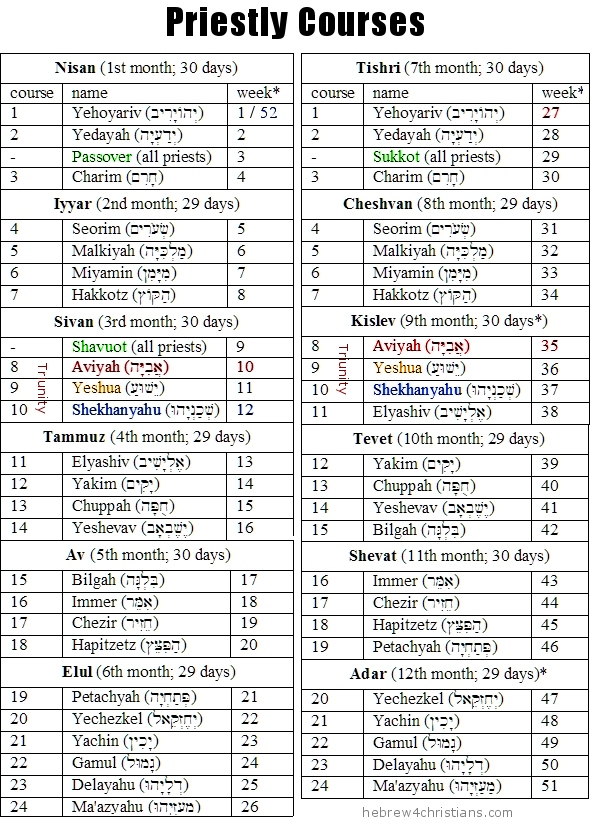
Note that this weekly schedule of the Temple service allows us to infer the birth date of both John the Baptist and Yeshua the Messiah. Of particular interest is the eighth course of the priests, called the "Course of Aviyah" (mentioned in 1 Chr. 24:10) which was the course that that Zechariah served (Luke 1:5). Now since the eighth course would serve either during the month of Sivan or later during the month of Kislev (see see table above), we have two possibilities regarding establishing the birth date of Yeshua the Messiah. If the visitation of Gabriel occurred during Zechariah's first course of service (i.e., the 10th week), then John would have been conceived sometime during the month of Sivan (Luke 1:23-4), and adding 40 weeks to this (the normal time of human gestation) John would have been born sometime in the month of Nisan, perhaps around the time of Passover. Furthermore, since Yeshua was conceived six months after John was conceived (Luke 1:24-27, 36), adding six months (or 24 weeks) to the end of Sivan implies his conception would have occurred in mid to late Kislev (near the time of Chanukah). Adding 40 weeks to this (again, the approximate time of human gestation), Yeshua then would have been born sometime in the month of Tishri, during the season of Sukkot (i.e., "Tabernacles"). On the other hand, if the visitation by Gabriel occurred during Zechariah's second service (i.e., 35th week), then John would have been conceived after Yom Kippur (Luke 1:8-23) and born 40 weeks later in month of Tammuz. Again, since Yeshua was conceived six months after John was conceived (Luke 1:24-27, 36), adding six months (or 24 weeks) would imply he was conceived during Passover and born later during the month of Tevet, near the traditional late December birth...
For more on this topic see "Christmas Day: Was Jesus Really Born on December 25th?" or download the printable version here:
Note: You might not agree with my tentative conclusions here, but if you want to explore the topic more rigorously, please do your own research on the question. Read the relevant Hebrew texts, do the math, consult the Jewish calendar, read the New Testament, check the Greek, and determine whether you think Zechariah was serving at the Temple during the month of Sivan or later, during Tishri, perhaps during the time of Yom Kippur. Shalom!
The Father of Light...

12.24.18 (Tevet 16, 5779) It is written in our Scriptures: "God is light and in him is no darkness at all" (1 John 1:5). Our Savior is "the Light of the world," the Divine Message that gives light to every soul who is born (John 1:9). As the Source of all light, his power is irrepressible, invincible, and overcomes every shade of darkness. Yeshua is the Logos (Λόγος), the underlying "logic" of all of creation. Unlike the transient radiance of the heavenly bodies, the Divine Light remains constant and supreme over all of creation, without any diminution or variation: God is the "Father of Lights" (James 1:17). And just as we know that the sun still shines even on the most overcast of days, so we understand that the Divine Presence is always there -- always giving, always shining, always loving us... We can trust in the power of our God to help us, since His radiance and truth pervade the darkness to enlighten our way (Psalm 112:4). As Yeshua said of his mission, "I have come into the world as light, so that whoever believes in me may not remain in darkness" (John 12:46). O LORD God, let your light shine upon us...
אֱלהִים יְחָנֵּנוּ וִיבָרְכֵנוּ
יָאֵר פָּנָיו אִתָּנוּ סֶלָה
E·lo·him · ye·chon·nei·nu · vi·var·khei·nu
ya·er · pa·nav · it·ta·nu · se·lah

"May God be gracious to us and bless us
and make his face to shine upon us, selah."
(Psalm 67:1)

True spirituality is inner light that comes from union with Messiah. "God is light, and in him is no darkness at all." We "walk in the light," experiencing inner peace and joy in the Holy Spirit when we heed and obey the Voice of God's love and abide in the secret place of His grace. The people of God are united to one another by the power of God's love. O LORD God, "light up my eyes lest I sleep the sleep of death" (Psalm 13:3). May the light and love of the Lord our God shine within you, friends. Happy holidays and every blessing to you.....
The Centrality of Exodus...

[ The following is related to our Torah reading for this week, Parashat Shemot... ]
12.23.18 (Tevet 15, 5779) The Exodus is perhaps the most fundamental event of Jewish history; it is "the" miracle of the Torah. In addition to being commemorated every year during Passover (Exod. 12:24-27; Num. 9:2-3; Deut. 16:1), it is explicitly mentioned in the first of the Ten Commandments (Exod. 20:2), and it is recalled every Sabbath (Deut. 5:12-15). The festivals of Shavuot (Pentecost) and Sukkot (Tabernacles) likewise derive from it (the former recalling the giving of the Torah at Sinai and the latter recalling God's care as the Exodus generation journeyed from Egypt to the Promised Land), as does the Season of Teshuvah (repentance) that culminates in Yom Kippur (the Day of Atonement). Indeed, nearly every commandment of the Torah (including the laws of the Tabernacle and the sacrificial system) may be traced back to the story of the Exodus, and in some ways, the entire Bible is an extended interpretation of its significance. Most important of all, the Exodus both prefigures and exemplifies the work of redemption given through the sacrificial life of Yeshua the Messiah, the true King of the Jews and the blessed Lamb of God.
The deeper meaning of exile concerns blindness of the divine presence. The worst kind of exile is not to know that you are lost, away from home, in need of redemption... That is why Egypt (i.e., Mitzraim) is called metzar yam - a "narrow straight." Egypt represents bondage and death in this world, and the exodus represents salvation and freedom. God splits the sea and we cross over from death to life. Since Torah represents awareness of God's truth, Israel was led into a place of difficulty to learn and receive revelation (Gen. 46:1-7). Out of the depths of darkness God's voice would call his people forth. Likewise we understand our "blessed fault," the trouble that moves us to cry out for God's miracle in Yeshua... Indeed the New Testment states that Yeshua "appeared in glory and spoke of his exodus (τὴν ἔξοδον αὐτου) which he would accomplish at Jerusalem" (Luke 9:31).
"These are the Names..."

[ The following is related to our Torah reading for this week, Parashat Shemot... ]
12.23.18 (Tevet 15, 5779) This week's Torah portion (the first of the Book of Exodus) is called Shemot (שְׁמוֹת, "names") because it begins with a list of the "names" of the sons of Jacob who came to dwell in the land of Goshen: וְאֵלֶּה שְׁמוֹת בְּנֵי יִשְׂרָאֵל הַבָּאִים מִצְרָיְמָה / "These are the names of the sons of Israel who came to Egypt" (Exod. 1:1). Now while it's true that the Scriptures here list the names of Jacob's descendants, this portion more importantly refers to the Names of the LORD God of Israel Himself. "These are the names..."
To see this, let's consider the central story of our reading, namely, the commissioning of Moses at the Burning Bush (see Exod. 3:1-20). Note that the Torah states that it was the Angel of the LORD (i.e., Malakh Adonai: מַלְאַךְ יהוה) who appeared to Moses בְּלַבַּת־אֵשׁ מִתּוֹךְ הַסְּנֶה / "in a flame of fire out of the midst of a bush" (Exod. 3:1-2). But then the Torah goes on to say that the LORD (יהוה) saw Moses drawing near to the bush while God (i.e., Elohim: אֱלהִים) called out to him. God (i.e., Elohim) then commanded Moses to remove his sandals and identified Himself as the "God of Abraham (i.e., Elohei Avraham: אֱלהֵי אַבְרָהָם), the God of Isaac (i.e., Elohei Yitzchak: אֱלהֵי יִצְחָק), and the God of Jacob (i.e., Elohei Ya'akov: אֱלהֵי יעֲקב)." In this short and dramatic account we have several Names of God presented - the Angel of the LORD, the LORD, God (Elohim), and the "God of Abraham, the God of Isaac, and the God of Jacob" - all of which refer to the One true God!
When God commissioned Moses to be His shaliach (שָלִיחַ) - His emissary - to go before Pharaoh and lead the children of Israel back to the Promised Land, he objected that he was unfit for the task. He protested that he was kevad peh - "heavy of mouth" and kevad lashon, "heavy of tongue," and therefore unable to speak on behalf of the LORD (Exod. 4:10). God reminded him that He was the Creator of the mouth: "Who makes him mute, or deaf, or seeing, or blind? Is it not I, the LORD?" (Exod. 4:11).
Perhaps it was because Moses was "heavy of mouth" that he continued to object to God's plan. After all, what would Moses say if he were asked what God's Name was? Perhaps Moses couldn't speak well enough to properly enunciate the Divine Name? It is revealing to understand the LORD's reply: אֶהְיֶה אֲשֶׁר אֶהְיֶה / "Ehyeh Asher Ehyeh ('I will be what I will be'); and He said, "Say this to the people of Israel, 'I AM (אֶהְיֶה) has sent me to you.'" Then God (i.e., אֱלהִים) went on to "spell it out" for Moses: "Say this to the people of Israel, 'The LORD (יהוה), [namely] the God of your fathers, [namely] the God of Abraham (אֱלהֵי אַבְרָהָם), [namely] the God of Isaac (אֱלהֵי יִצְחָק), and [namely] the God of Jacob (אֱלהֵי יעֲקב), has sent me to you.' This is my name forever (זֶה־שְּׁמִי לְעלָם), and thus I am to be remembered throughout all generations" (Exod. 3:14-15).
Now I included the Hebrew text here to make it explicit that the distinct Names of God in this passage (i.e., יהוה, אֱלהִים, מַלְאַךְ יהוה, and so on) all refer to the One true LORD God of Israel, Maker of Heaven and earth. Indeed, the Torah makes it clear that the Name of the LORD YHVH (יהוה) is associated with the phrase ehyeh asher ehyeh (rendered as "I AM THAT I AM" in the KJV), which derives from the Qal imperfect first person form of this verb hayah (הָיָה): "I will be." In other words, there is a direct connection between the Name YHVH and Being and Reality itself. YHVH is the Source of all being and has being inherent in Himself (i.e., He is "necessary" Being). Everything else is contingent being that derives existence from Him. The name YHVH also bespeaks the utter transcendence of God. In Himself, God is beyond all "predications" or attributes of language: He is the Source and Foundation of all possibility of utterance and thus is beyond all definite descriptions. Hence the LORD is sometimes simply called HaShem, "the Name," since no amount of verbiage can do justice to the infinite majesty and truth of His Life...
People who argue about the name of God miss the point... As I've said before, God is "Presence" (Exod. 3:13-14), "Breath" (Gen. 2:7; Num. 16:22), "Life" (Deut. 30:20), "Love" (Exod. 34:6-7), and the "I-AM-WITH-YOU One" who keeps His promises. The Name YHVH (יהוה) means that "God was (i.e., hayah: היה), God is (i.e., hoveh: הוֶה), and God always will be (i.e., veyihyeh: וְיִהְיֶה)," which implies that He is ever present and not restricted by time or space. Moreover, God is called havayah (הֲוָיָה), which means He sustains creation by the Word of His power: "In Him we live, move, and have our being" (Acts 17:28; Heb. 1:3).
Note: For more, see "Shemot: Divine Names Theology" and "Using the Name in Vain."
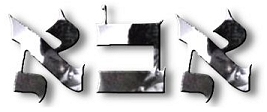 |
Parashat Shemot - שמות

12.23.18 (Tevet 15, 5779) Our Torah reading for this week is the very first of the Book of Exodus, called parashat Shemot (שְׁמוֹת). This portion begins directly where the Book of Genesis left off, namely by listing the various "names" (shemot) of the descendants of Jacob who came to Egypt to live in the land of Goshen. Over time Jacob's family flourished and multiplied so greatly that the new king of Egypt – who did not "remember" Joseph - regarded them as a political threat and decided to enslave them. When the king's oppression did not curb their growth, however, he cruelly commanded the Hebrew midwives to kill all newborn Jewish boys. When the midwives bravely refused to obey, however, the Pharaoh commanded that all newborn boys were to be drowned in the Nile river (the Hebrew word for Egypt, Mitzrayim (מִצְרַיִם), can be rearranged to form the phrase tzar mayim (צַר מַיִם), meaning "torture through water," which was the plan of the nefarious Pharaoh).
During this time of terrible and appalling oppression, a family from the tribe of Levi bore a son and hid him for three months. When the baby could no longer be concealed, however, his mother Yocheved (יוֹכֶבֶד) set him afloat in the Nile River inside a basket, praying that he might somehow escape death. Miriam (מִרְיָם), the baby's sister, watched what would happen, and soon the basket was discovered by the daughter of Pharaoh, who decided to save the baby and adopt him as her own son. Miriam then cleverly offered to have her mother become the baby's wet-nurse for the princess. After the child was duly weaned, he was brought to Pharaoh's palace to live as the princess' son. The Egyptian princess named him "Moses" (משֶׁה), meaning "drawn out" (מָשָׁה) of the water.
Later, when Moses was a full-grown man, he "went out to his people and looked on their burdens." When he saw an Egyptian beating an Israelite slave, he killed the Egyptian and hid his body in the sand. The following day he tried to reconcile two Israelites who were fighting, but the one in the wrong prophetically objected: "And who made you a prince and judge over us? Do you want to kill me as you killed the Egyptian yesterday?" Upon hearing this Moses decided to flee from Egypt to Midian. There he rescued Zipporah (צִפּרָה), the daughter of Jethro (יִתְרוֹ), a Midianite priest. Soon afterward, Moses decided to work for Jethro and married Zipporah. They had a son named Gershom (גֵּרְשׁם).
After nearly 40 years living in Midian as a shepherd, God called out to Moses from the midst of a burning bush (סְנֶה בּוֹעֵר) to commission him to lead the Israelites out of Egypt back to the land He promised to the descendants of Abraham, Isaac, and Jacob. When Moses protested that he was inadequate for this task, God gave him three "signs" to authenticate his message. God also appointed his brother Aaron to be his spokesperson. Moses and Aaron then went to the Pharaoh and demanded that the Israelites be permitted to leave Egypt to worship the LORD in the wilderness. The Pharaoh, however, dismissed Moses and his God, and increased the workload of the slaves by forcing them to make bricks without straw.
Happy holidays chaverim, and may we all have great joy and strength as we begin reading a new book of Torah this week. Shavuah tov!
Faith's "for you" love...
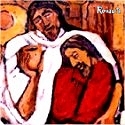
12.21.18 (Tevet 13, 5779) The first "movement" of the heart toward God is expressed in the little word "O," an exlamation of a soul that seeks to be consciously "visible" before the LORD and to gain the blessing of His audience. "O LORD, hear my prayer..." "O LORD my God, in thee do I put my trust." "O LORD, unto Thee do I lift up my soul..." The "O" is the beginning of our prayer, as well as its end, and In truth, we never get past its evocation.
The "O" is a pliable word, able to range over the gamut of our emiotions. Sometimes we are driven by pain, and the emotional tone of "O" becomes one of lament, of sorrow, or a cry for deliverance. At other times "O's" bespeaks an expression of exulation and praise, or a cry for justice, and so on. But the split second before the word "O" is uttered is what is most essential, because it is the "O" of a holy hush, an "O" of surrender that arises when the soul decides to earnestly call out to God for life...
It is wrtten in our Scriptures: "Now without faith it is impossible to please him, for the one who approaches God must believe that he exists and that he rewards those who seek him" (Heb. 11:6). So the act of saying "O" to the LORD is an essential act of faith, a lifting up, or a turning of the heart to reach out to God. Such faith is a faith is the struggle to believe in the unseen presence of the Living God; it is an act of will that chooses to trust that ultimate reality is "for-you" reality, despite the temptation to succumb to fear. The "O" is the bold step of the soul that comes before the Throne of Grace to find remedy for what ails its way.
But faith is a matter of earnestness and heart. As Kierkegaard once said, "Truth is not something you can appropriate easily and quickly. You certainly cannot sleep or dream yourself into the truth. No, you must be tried, do battle, and suffer if you are to acquire truth for yourself." Indeed "faith" that simply conforms or assents with a creedal formula may actually indicate doubt if it refuses to ask searching questions and to struggle through our limitations. Simply going to a religious service and mindlessly reciting (or assenting to) a prayer may therefore be a temptation against the true life of faith... Indeed theology can become an evil if it no longer regards itself as a quest for truth as much as the protection of a self-serving belief system ("O thank you God that I am not like other men"). A living faith realizes that God cannot be known by means of human reason but by the agency of the heart quickened by the Holy Spirit.
Faith pours out its heart to God like a child pleading with his father. "O Father! O Daddy!" Doesn't God call you his child? "You are children of the LORD your God" it says in our Scriptures (Deut. 14:1). When you trust God as your Father you are free to "come boldly" before him, sharing your thoughts, desires, feelings, joys, sorrows, and troubles with him.
Shabbat shalom and happy holidays, chaverim.
Do you now believe?

12.21.18 (Tevet 13, 5779) Soren Kierkegaard (1813-1855) notes that many people read the Bible after "skipping to the end" and pretending they know the "whole megillah," namely that love wins, and all shall be well... Nevertheless we must remember that the LORD is completely just and there is no intrinsic advantage given to Yeshua's contemporaries over those who are living today. The same message requires the same faith to encounter the truth of the Teacher. "I AM the resurrection and the life. Whoever believes in me, though he die, yet shall he live, and everyone who lives and believes in me shall never die. Do you believe this?" (John 11:25-26). Or do you suppose that you would have acted in faith had you been alive when Yeshua was here on earth? Consider well. When Mary held her newborn son and changed his soiled clothing, did she then believe he was the Savior of the world? Did she fully understand the "end of the story" at that time? When the disciples watched with horror as their Master was arrested, unjustly condemned, and then brutally crucified, did they then believe God was manifest in the flesh? Did they fathom the depths of God's providential love for them? And even after the resurrection from the dead, when Yeshua had directly appeared to his followers and they watched as he ascended on high, did they trust that eternal death was forever swallowed up by His overmastering and triumphant life?
Do you think our present generation would more readily accept the message of Yeshua more than that generation 2,000 years ago? That generation clamored: "We will not have this man rule over us!" (Luke 19:14), yet is this not the recurrent mantra of spiritual darkness spoken throughout the generations? How many of us read the Gospels and encounter something radically challenging, only to excuse ourselves and pretend that the question is not being asked of us? How many of us "take up our cross" and follow the path of sacrificial love? "But I say to you, love your enemies and do good to them that hate you, bless those who curse you, pray for those who abuse you" (Luke 6:27-28). Many want to believe they are following Yeshua's Torah here but hesitate when they hear such things; they don't really want to trouble themselves by changing or denying their natural impulses... Kierkegaard laments: "The matter is quite simple. The Bible is very easy to understand, but we Christians are a bunch of scheming swindlers. We pretend to be unable to understand it because we know very well that the minute we understand we are obliged to act accordingly."
We must listen with a heart of faith to unlock the truth that speaks to the heart. If you believe only what you can tolerate, however, your faith is actually grounded in your own interests, not in the Divine Voice of Love that seeks to heal the world. "For he is our God, and we are the people of his pasture and the sheep of his hand today -- if you hear his voice" (Psalm 95:7). Today, if you hear his voice and do not harden your heart (Heb. 3:15). "Take care, brothers, lest there be in any of you an evil, unbelieving heart, leading you to fall away from the living God, but encourage one another every day, as long as it is called "today," so that none of you may be hardened by the deceitfulness of sin" (Heb. 3:12-13).
Unto us a Son is Given...
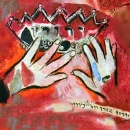
12.21.18 (Tevet 13, 5779) Regarding the birth of Messiah it is written in our Scriptures: "For unto us a child is born, unto us a son is given; and the government shall be upon his shoulder, and his name shall be called: the Wonderful Counselor (פֶּלֶא יוֹעֵץ), the Mighty God (אֵל גִּבּוֹר), the Father of Eternity (אֲבִיעַד), the Prince of Peace" (Isa. 9:6). "Unto us a child is born" - this is the first advent - when the Messiah would be rejected, suffer, and die for our sins; and "unto us a son is given" - this is the second advent - when the Messiah will reign as David's greater regent in the kingdom promised to Zion.
כִּי־יֶלֶד יֻלַּד־לָנוּ בֵּן נִתַּן־לָנוּ
וַתְּהִי הַמִּשְׂרָה עַל־שִׁכְמוֹ
וַיִּקְרָא שְׁמוֹ פֶּלֶא יוֹעֵץ
אֵל גִּבּוֹר אֲבִיעַד שַׂר־שָׁלוֹם
kee - ye'·led · yoo·lad - la'·noo · bein · nee·tan - la'·noo
va·te·hee · ha·mees·rah · al - sheekh·moh
va·yee·kra · she·moh · pe'·le · yo·eitz
el · gee·bor · a'·vee·ad · sar - sha·lom

"For unto us a child is born, unto us a son is given;
and the government shall be upon his shoulder,
and his name shall be called: the Wonderful Counselor,
the Mighty God, the Father of Eternity, the Prince of Peace."
(Isa. 9:6)

Download Study Card
Notice that the four terms used to describe this coming King clearly transcend the historical figure of any earthly king of Israel. For example, the word "pele" in pele yo'etz (wonderful counselor) is used in Judges 13:18 regarding the name of the Angel of the LORD (who in verse 22 is identified as God). El Gibbor (Mighty God) is clearly a title for the Holy One of Israel (Isa. 10:20-21; Psalm 24:8). Avi'ad (Father of Eternity) refers to God as Avinu Malkenu (see Isa. 63:16, 1 Chron. 29:10; Psalm 68:5; Mal. 2:10). And as for Sar Shalom (Prince of Peace), both the Talmud and Scripture refer to "the Name of God as Peace" (Shab. 10b, Judges 6:24). It is clear, therefore, that these terms are designations for the LORD God of Israel and not merely that of a human being. "Therefore the Lord himself will give you a sign. Behold, the virgin shall conceive and bear a son and shall call his name Immanuel (עִמָּנוּ אֵל), "God is with us" (for more on this, see this page).
Many Christians focus on Isaiah 9:6 and rightly link it to the nativity account of the gospels, but it is important to understand that the promise is also linked to the eschatological future: "Of the increase of his government and of peace there will be no end, on the throne of David and over his kingdom, to establish it and to uphold it with justice and with righteousness from this time forth and forevermore. The zeal of the LORD of hosts will do this" (Isa. 9:7; Luke 1:32-33). Notice that the phrase "his rule will be increased" (לְםַרְבֵּה הַמִּשְׂרָה) is spelled using a closed Mem (ם) instead of the usual open Mem (מ), which suggests that the authority of the One to whom the rule will be given is final and complete. The "child that was born" will be soon be revealed as "the Son that is given" to Israel. One day soon Yeshua will return to Zion (i.e., Jerusalem) to establish His kingdom and fulfill God's promises to Israel. That day and hour are close... Come quickly, LORD!
לָכֵן יִתֵּן אֲדנָי הוּא לָכֶם אוֹת
הִנֵּה הָעַלְמָה הָרָה וְילֶדֶת בֵּן
וְקָרָאת שְׁמוֹ עִמָּנוּ אֵל
la·khen · yit·ten · Adonai · hu · la·khem · ot
hin·nei · ha'al·mah · ha·rah · ve'yo·le·det · ben
ve'ka·rat · she·mo · im·ma·nu · El

"Therefore the Lord himself will give you a sign.
Behold, the virgin shall conceive and bear a son
and shall call his name "Immanuel." (Isa. 7:14)

Why the Incarnation Matters...

12.20.18 (Tevet 12, 5779) At Sinai we heard the Voice of God (קוֹל אֱלהִים) speaking from the midst of the Fire (Deut. 4:33), an event that foreshadowed the great advent of the King and Lawgiver Himself, when the Eternal Word (דְבַר־יְהוָה) became flesh and dwelt with us (Phil. 2:6-7; John 1:1,14). Any theology that regards God as entirely transcendent (i.e., God is beyond any analogy with the finite) will have a problem with divine immanence (i.e., God is inherent and involved within the finite), since the highness, holiness, and perfection of God will make Him seem distant, outside of us, far away, and unknown... Incarnational theology, on the other hand, manifests the nearness of God to disclose the divine empathy. Indeed, the LORD became Immanuel (עִמָּנוּ אֵל), "God with us," to share our mortal condition, to know our pain, and to experience what it means to be wounded by sin, to be abandoned, alienated, forsaken. It is God's own bittul hayesh (בִּטּוּל הַיֵּשׁ) - his self-nullification for the sake of love and truth. The "Eternal made flesh" bridges the gap between the realm of Ein Sof (אין סוף), the infinitely transcendent One, and the finite world of people lost within their sinful frailty. Of course we believe Adonai Echad (יְהוָה אֶחָד) - that the "LORD is One" - both in the sense of being exalted over all things but also in the sense of being compassionately involved in all things (Rom. 11:36). We therefore celebrate the giving of the Torah both at Sinai and especially at Bethlehem with the birth of Messiah. We celebrate that God is indeed the King and Ruler over all, but we further affirm that God's authority and rule extends to all worlds - including the realm of our finitude and need...
As I've mentioned elsewhere, the climax of Sinai was the revelation of the Sanctuary. The two tablets of the law, summarizing the Ten Commandments, were stored inside the famous Ark of the Covenant (אֲרוֹן בְּרִית־יְהוָה), a sacred "three-in-one" box placed in the innermost chamber of the Tabernacle called the Holy of Holies (קדֶשׁ הַקֳּדָשִׁים). As such, the Ark served as kisei ha-kavod (כִּסֵּא הַכָּבוֹד), the Throne of Glory itself. Upon the cover (or crown) of the Ark (i.e., the kapporet) were fashioned two cherubim (i.e., angel-like figures) that faced one another (Exod. 25:17-18). According to the Talmud (Succah 5b), each cherub had the face of a child - one boy and one girl - and their wings spread heavenward as their eyes gazed upon the cover (Exod. 25:20). It was here that God's Voice would be heard during the Yom Kippur service, when sacrificial blood was sprinkled upon the crown to symbolize the atonement of sin secured through Messiah, the Word that became flesh for us... In the very heart of the Sanctuary, then, we see the Word of God and the sacrficial blood.
The LORD God Almighty was clothed with human skin: our flesh, our bones... The miracle of the incarnation is the Absolute Paradox, as Kierkegaard said, wherein the infinite and the finite meet in mystery of the Divine Presence. Here God "touches a leper," eats with sinners and prostitutes, sheds human tears, and suffers heartache like all other men... The gloriously great God, the very Creator of the cosmos, has "emptied Himself" to come in the form of a lowly servant (δοῦλος) - disguised to the eyes of the proud and hardhearted, but is revealed as High Priest to those who are genuinely broken and in profound need. The LORD God is God over all possible worlds, and that includes both the celestial realms of the heavens but also the world of the fallen, the ashamed, the alienated, and the lost... God's infinite condescension reveals and augments the majesty of His infinite transcendence. There is no world - nor ever shall there be such - where the LORD God Almighty does not reign and have preeminence.
Do not suppose for a moment that the Torah of Moses does not teach "incarnational" theology. Since God created human beings in his image and likeness, the "anthropomorphic language" of Scripture is meaningful. The LORD reveals himself in human terms - using human language, expressing human emotions, and so on, as it says: Moses spoke to God panim el panim - "face to face" (Deut. 34:10). The Torah always has to take on human form - the Word made flesh - for the sake of human beings who live in flesh and blood reality...
The greatest expression of God's word is found in the Presence of Yeshua. This is the Word of God that "tabernacles" with us, full of grace and truth (John 1:14). Yeshua is the "Living Torah," Immanuel (עִמָּנוּ אֵל), "God with us," who enters our world to rescue us from death. Our Scriptures state that "in these last days God has spoken to us by his Son, whom He appointed the Heir of all things, through whom also He created the worlds" (Heb 1:2). Note that the Greek construction for the phrase translated, "by his son" is ἐλάλησεν ἡμῖν ἐν υἱῷ, which literally means "he spoke to us in Son" -- that is, in the language or voice of the Son of God Himself... God speaks the language "of Son" from the midst of the fire revealed at Zion. "Therefore, since we are receiving a kingdom that cannot be shaken, let us be thankful, and so worship God acceptably with reverence and awe (μετὰ αἰδοῦς καὶ εὐλαβείας) - for our God is Esh Okhelah - a Consuming Fire" (Heb. 12:28-29).
Addendum: Consider further the metaphorical and anthropomorphic language of the Scriptures: God "sees," God "hears," the "hand of the LORD" saves, etc. Without an implied incarnational theology, there would be no language that we could comprehend about God who is the Infinite One that transcends all things... God gets angry; God feels sorrow; God is jealous; God is a lover, etc. all these metaphors bring the language of heaven into the world of humanity... The Spirit that imparts revelation does so inside a human brain and is translated into human apprehension. Yeshua is the Substance of the shadowy talk of analogical language; he embodies God-life before us.... Yeshua is the Word of God made flesh -- able to touch us, know us, share in our suffering, heal us of our sin-sickness, etc.
Yom Kippur and Christmas...

12.20.18 (Tevet 12, 5779) If the priest Zechariah was performing the Yom Kippur avodah (high priestly service) when he was visited by the angel Gabriel (as seems to be the case given the context, see Luke 1:8-23), and his wife Elizabeth conceived about that time (see Luke 1:24, that is, sometime in the middle of the month of Tishri), and her cousin Mary was then told of the incarnation six months later, during Passover season (Luke 1:26, 36), then the birth of Yeshua would have been sometime during the middle of the month of Tevet, which is indeed close to the traditional December 25th date observed by the majority of Christians (the Jewish historian Alfred Edersheim said that Yeshua was born on the Tenth of Tevet). Indeed, one implication of this interpretation is that the Lamb of God (שׂה הָאֱלהִים) was conceived during Passover, which seems appropriate as the time of the Incarnation...
ὁ λόγος σὰρξ ἐγένετο καὶ ἐσκήνωσεν ἐν ἡμῖν -- "The Word became flesh and dwelt among us" (John 1:14) -- which of course is the essence of the gospel message. As it is written concerning the birth of Messiah: "For unto us a child is born, unto us a son is given: and the government shall be upon his shoulder: and his name shall be called Wonderful, Counselor, The mighty God, The everlasting Father, The Prince of Peace" (Isa. 9:6).
Of course the exact date of Yeshua's birth is existentially irrelevant, apart from the fact that he indeed was born into this world as our Savior, and indeed, the New Testament stresses the significance of his death more than his birth (see 1 Cor. 2:2; 1 Cor. 15:3-4). Nevertheless, we use the "good eye" to regard our Christian friends who honor this time to remember the birth of Yeshua, even if we have convictions that may lead us to think Messiah was born during Sukkot. For some further discussion about the anniversary of the birth of Yeshua the Messiah, see the article, "Christmas: Was Jesus really born on December 25th?"
Note: The point of this entry was to explore the traditional date as a possibility, not to be dogmatic and intolerant. You certainly do not have to agree with the traditional date, though if you disagree, then you should at least address the pertinent question of what Zechariah was doing in his service when the prophecy of the birth of John was made. Above all, follow your own convictions and walk in peace toward all people (Heb. 12:14). Shalom.
He was Born to Die...

12.20.18 (Tevet 12, 5779) Though the promised birth of Yeshua may have occurred during the holiday of Sukkot (Tabernacles), with the incarnation occurring during Chanukah (the Festival of Light), many people of good faith observe the traditional "Gregorian Calendar" date of December 25th, reckoning ... Regardless of your particular conviction regarding the date of Yeshua's birth, the most important thing to remember is that He was born to die (Heb. 10:5-7). The story of his birth is only significant in relation to His sacrificial death (Mark 8:27-33). The "manger" scene leads directly to the cross at Moriah. Indeed, in Jewish tradition the day of one's death is more important than the day of one's birth, since death summarizes the meaning and significance of a person's life in this world. Birth represents potential, whereas death represents inheritance... Therefore the Jewish custom is to commemorate the anniversary of a person's death (i.e., yahrzeit: יארצייט) and not the date of his or her birth. This custom is derived from the Scriptures themselves: "A good name is better than precious ointment, and the day of death than the day of birth" (Eccl. 7:1):
טוֹב שֵׁם מִשֶּׁמֶן טוֹב
וְיוֹם הַמָּוֶת מִיּוֹם הִוָּלְדוֹ
tov · shem · mee·she'·men · tov
ve·yom · ha-ma'·vet · mee·yom · hee·va·le·do

"A good name is better than fragrant oil,
and the day of death than the day of birth."

Hebrew Study Card
The day of Yeshua's death (on Erev Pesach) represents the message of the Gospel story itself: "God so loved the world that He gave His only begotten Son, that whoever believes in Him should not perish but have eternal life" (John 3:16). This is of "first importance": Yeshua was born to die for our sins, to make us right with God, and was raised from the dead to vindicate the righteousness of God (1 Cor. 15:3-5). "For our sake God made Him to be sin who knew no sin, so that in him we might become the righteousness of God" (2 Cor. 5:21). The birth of the Messiah (or rather His incarnation) was the "first step" toward His sacrifice for our deliverance (Heb. 2:9-18). As Paul said, "I decided to know nothing among you except Yeshua the Messiah - and him crucified" (1 Cor. 2:2).
Note: For more on this, see "He was born to Die." For a discussion about possible birth dates for Yeshua, see "Was Jesus born on December 25th?" For traditional Christmas readings from the New Testament, see Matt. 1:18-2:12, Luke 1:26-2:20.
Trusting God's Heart...

12.19.18 (Tevet 11, 5779) Some people want to say that God is love but then add the condition that such love is ours only if we observe God's commandments (whether these are commandments of behavior or belief). However if we regard God's love as conditional - based on something we do - then it is no longer God's love that is of utmost concern but ourselves - our devotion, our morality, our "religion," and so on. Moreover, if you attempt to earn God's approval by doing certain things (and not doing others), you are back "under the law," striving to attain some measure of self-justification: you will only be as secure as your own best efforts -- a "self-improvement" project that will exhaust you in the end. The good news, on the other hand, is that you are truly loved by God -- despite your many flaws and your sins -- just as the "prodigal son" was loved by his father and was accepted despite his many misdeeds (Luke 15:11-32). Likewise, the incarnation of Yeshua means that God "runs to meet and embrace you," regardless of whatever happened in your life that made you run away from home. And whatever else it may be, sin is the separation from God's love, but Yeshua made the decision to die for your sins before you were born. Your sin cannot overrule God's surpassing and personal love for your soul, since God gave up his very life for you to find life. God's love is for you, friend, whether you believe it or not. Having faith in God's love puts you in alignment with Reality, however, healing the inner wound of your lost condition, giving you peace, and clothing you with the robe of God's own righteousness.
The Hebrew word for "life" is chayim (חַיִּים), a plural noun that contains two consecutive letter yods (יי) that picture two "hands held together" (the Hebrew word yad [יָד] means "hand"), or the union of our spirit with God's Spirit. The word itself reveals that there is no life apart from union with God, who extends his hand to you and says, "Live in me" (John 15:4). We live in him by faith, receiving our daily bread as his flesh and our drink as his blood (John 6:53). Yeshua is the Source of all life, and we find nourishment, strength, and fullness of joy in his life. The Lord is our light and our salvation, the Mediator of divine life (Psalm 27:1; John 1:4). As it is written, "Whoever has the Son has the life; but whoever does not have the Son of God does not have the life" (1 John 5:12).
Postscript: You might ask, "Is there no need for repentance?" Indeed there is! The word teshuvah means returning to God... It is not the same word used to express remorse for sin, etc. There is a place for remorse, contrition, godly sorrow for sin, but these come after you learn of the love of God, after you encounter the truth... There is repentance from sin, though that too is a gift from God's heart to you (John 6:44). Confession means saying the same thing about sin that God says -- a break in the heart of love.
"For the law of the Spirit of life (תּוֹרַת רוּחַ הַחַיִּים) has set you free in Yeshua the Messiah from the law of sin and death (תּוֹרַת הַחֵטְא וְהַמָּוֶת). For God has done what the law, weakened by the flesh, could not do. By sending his own Son in the likeness of sinful flesh and for sin, he condemned sin in the flesh, in order that the righteous requirement of the law might be fulfilled in us, who walk not according to the flesh but according to the Spirit" (Rom. 8:2-4). As I've said before, nothing is required of the "old nature" other than for it to be reckoned dead (Col. 3:3; Rom. 6:11; Gal. 2:20). All of the commandments of the New Testament are directed to the new nature, the life of Messiah in you. I daresay I've written more about teshuvah and repentance than most ministries out there, over the last 20 years now. Be careful not confuse teshuvah with the idea of living for God by means of the Spirit.
The Birth of the Messiah...

[ The following message recalls the birth of our beloved Messiah Yeshua... ]
12.19.18 (Tevet 11, 5779) Though the world system corrupts the message of the birth of Messiah for the sake of avarice and greed, take a moment to reflect on its ongoing spiritual significance, namely, that God emptied Himself (κένωσις) of His regal glory and power to become your High Priest, able to fully sympathize with your weakness, frailty, shame, and chronic sinfulness (Heb. 4:15-16; Phil 2:7-8). Almighty God, the Presence of Love, the Heart of Reality, clothed himself in human flesh and bone to become Immanu'el (עִמָּנוּ אֵל) - "God with us" - so that we could be touched by Him, healed by Him, and redeemed by Him... Therefore let's join the refrain of heavenly host: "Glory to God in the highest, and upon earth peace, good will toward men" (Luke 2:14). Yeshua is the Eternal Sign and Wonder of the LORD God Almighty...
כָּבוֹד לֵאלהִים בַּמְּרוֹמִים
וְשָׁלוֹם עֲלֵי אֲדָמוֹת בְּקֵרֵב אַנְשֵׁי רְצוֹנוֹ
ka·vohd · le·lo·heem · ba·me·ro·meem
ve·sha·lom · a·lei - a·da·moht · bee·ke'·rev a·nee·shei · re·tzo·no

"Glory to God in the highest,
and upon earth peace, good will toward men."
(Luke 2:14)

Hebrew Study Card
Consider the absolute humility of God as He chose to enter into this world as "baby Jesus." Meditate on the glory and sheer paradox of God's love! "Baby Jesus" is the perfect disguise to hide the truth from the proud eyes of the flesh, though the humble of heart can see... "For since in the wisdom of God the world by its wisdom did not know God, God was pleased to save those who believe by the foolishness of preaching" (1 Cor. 1:21). For "who comprehends the mind of the LORD, or gives him instruction as his counselor?" Through his great plan to redeem people from the dominion of Satan and his agents in this evil world, God emptied Himself to become clothed in the frailty human flesh, born in a barn as the great Lamb of God, born to die as the ransom for all who will believe. Ah, what would we do without the gift of God, friends? What hope would we have? Regardless of the exact date of his birth of His birth, let's thank God that our Moshia (Savior) was willing to be born into this dark world to offer Himself as our sacrificial Redeemer! "For from him and through him and to him are all things. To him be glory forever. Amen."
What will you do, then, if you sincerely seek to follow the Torah's calendar in light of entrenched Christian customs? Well, we certainly may commemorate the birth of Messiah during the holiday of Sukkot (or Shavuot, etc.), though we must be careful to show charity and use the "good eye" toward those who may adhere to the traditional date for "Christmas." Likewise we commemorate the death and resurrection of Messiah during Passover and Firstfruits, respectively, though we do not begrudge those of good faith who honor these great events of salvation during what they call the "Pascha" or even the "Easter" season. Often we are tested in exactly this way, chaverim! We must not miss the "weightier matters" of extending love to others, as Yeshua clearly taught (Matt. 23:23). Moreover it is written, "Let every man be fully persuaded in his own mind" (Rom. 14:5; Col. 2:16). Friends, we must test the spirits -- and that includes our own! How do we treat the "stranger" among us? How do we regard the "weaker brother?" Do we demand that our doctrine be esteemed, or do we allow room for others to seek the Lord and his wisdom? Ask yourself: Does this person (or group) honor Yeshua as God the Son, the Redeemer of Humanity who died for our sins and rose from the dead? If so, then keep your heart warm and soft toward him or her, even if he or she has yet to discover the Jewish roots of their faith. "Strive for peace with everyone" (Heb. 12:14). "Let those of us who are mature think this way, and if in anything you think otherwise, God will reveal that also to you" (Phil. 3:15). Though we desire unity with one another (John 17:11), we cannot reasonably insist on doctrinal uniformity, especially in light of the frailty of our shared human condition... The truth of God is known in humility and love.
Postscript: First things First...
The Scriptures may not allow us to infer with absolute certainty the exact date of the birth of Messiah, though of course the same can be said for the patriarchs, for Moses, and for all the great heroes of our faith. One thing we agree upon, however, is that Yeshua not only was physically born into this world, clothed in our flesh, to offer himself up for our sins as the Lamb of God (John 2:29; Matt. 12:40, 16:21), but that he is alive right NOW, and we are therefore contemporaneous with his presence. Nevertheless our carnal pride tempts us to foolishly quibble about the date of his birth as if he were a common historical figure like Socrates or Shakespeare... Indeed there is always a danger whenever we talk about God, referring to God in the third person, making God to be an "object of knowledge" or attempting to analyze the Divine Presence. Regarding the life of Messiah Scripture makes clear that Yeshua was crucified and died on Erev Pesach and that he was raised three days and nights later, on the holiday of First fruits. The Apostle Paul, the greatest Torah sage of the Second Temple period, who radically encountered the risen Yeshua, later taught us that what was of "first importance" was that Yeshua died for our sins, was buried, and was raised from the dead for our justification according to the words of the Hebrew prophets, and that therefore what was most essential was to know him and the power of his resurrection (1 Cor. 2:2, 15:3-4; Phil. 3:10; Rom. 6:5, etc.). We must be careful not to make an idol out of our convictions or become proud of heart. It is often a test of faith to use the good eye and to refuse to be offended when your brother or sister disagrees with you. May the Living God help us all walk before His Presence in peace. Shalom.
Deception and the Coming Jewish Temple...
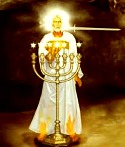
[ I am repeating the warning not to be seduced by those who are proclaiming that the Jewish Temple will soon be rebuilt and that this will herald the coming of the Messiah... ]
12.19.18 (Tevet 11, 5779) Some people get excited about prophetic news, particularly concerning Israel, but please be wary of those who claim that the rise of the "Third Temple" portends the advent of the Messiah, friends. Yeshua is the Substance and Meaning of all that the Temple represents; He is the Substance of the Vision of the Temple revealed to Moses at Sinai (Exod. 25:9,40; Heb. 8:5; 9:11; Matt. 12:6), just as He is the fulfillment of what the sacrificial system foretold (see Heb. 8-10; 10:14). Various religious groups (such as "The Temple Institute" [Rabbi Chaim Richman], "Breaking Israel News" [Rabbi Tuly Weisz, Eliyahu Berkowitz], "The Temple Mount Faithful" [Gershon Salomon] and even some "Messianic" ministries) regularly proclaim the Temple is nearly ready to be rebuilt and then the Messiah will finally come to deliver Israel from her enemies. Now these people are right that a Third Temple is coming, but are wrong about what it will truly represent. Indeed those who advocate the building of the Third Temple ignore the eschatological visions of the Hebrew prophets Daniel, Ezekiel, and Isaiah, and they certainly disregard the message of Yeshua the Messiah and the New Testament concerning acharit hayamim, or the prophesied "End of Days." Dear friends, do not be alarmed by those who say the Temple will soon be rebuilt in Israel, or those who claim that a Red Heifer has been found, or those who are excited that a Sanhedrin has been reconvened, and so on. Many Christian people have been fooled into sending money to these sorts of groups, thinking the are helping hasten the coming of the Messiah to Israel, but in reality they are unwittingly contributing to the establishment of a false Temple (מקדש שווא) that will be seized by the anti-Messiah, that is, the false Messiah (משיח השטן), who will then unleash terror and tribulation upon the world. Let the reader understand (Matt. 24:15).
Please do not misunderstand me here. Though we assuredly believe in the coming "End of Days" prophecies revealed in Scripture (including the construction of the Third Temple), that does not mean we should seek to establish the Third Temple in Israel, especially in light of the teaching of the New Testament regarding acharit hayamim... The Third Temple, or "Tribulation Temple," will indeed come, but it should not be confused with the Fourth Temple, Ezekiel's vision, which will be established at the time of Yeshua's reign in Zion during the Millennial Kingdom. Nor should either of these Temples be confused with the Heavenly Temple of the New Jerusalem which represents the World to Come. In other words, the coming Third Temple sets the scene for the prophesied "End of Days," though that doesn't mean we should support its construction, etc., since it is not a true Temple of the LORD.
Beware of false prophets, friends, who want you to rally behind a cause that is contrary to the truth of the Spirit of God...
The Shiloh Prophecy...

[ The following is related to our Torah for this week, Parashat Vayechi... ]
12.19.18 (Tevet 11, 5779) When the time came for Jacob (i.e., Israel) to die, he called all his sons together to bless them (Gen. 49:1-28). According to midrash, Jacob wanted to tell his sons about the "End of Days" (אַחֲרִית הַיָּמִים) when the Messiah would come, but was prevented by the Holy Spirit. According to Rashi, God prevented Jacob because He does not want anyone to know the "day or the hour" when the great King of Israel would appear. Jacob did, however, foretell that from the tribe of Judah (יְהוּדָה) would come the Messiah: "The scepter (שֵׁבֶט) will not depart from Judah, nor the ruler's staff from between his feet, until Shiloh (שִׁילוֹ) comes, and to him shall be the obedience (יקְהָה) of the people" (Gen. 49:10). Interestingly, the name "Judah" (יְהוּדָה) is spelled using all the letters of the Name YHVH (יהוה), with the addition of the letter Dalet (ד). Just as the tribe of Judah later was directly stationed in the front of the Mishkan (Tabernacle) in the camp formation in the wilderness, so the Holy Temple (i.e., Moriah) would later become part of Judah's territory in the promised land. Likewise, Yeshua Himself - a descendant of King David - was crucified and resurrected in the land of Judah. Truly the promised "Seed of Judah" represents the "doorway of the LORD" and is rightly named "the One whom his brethren would praise."
Like most prophecies in Scripture, the prophecy of Shiloh has a "dual aspect" or "double fulfillment." Shiloh, or the "King of the Jews" (a synonym for the Messiah, called "Christ" by Gentile Christendom) had indeed come "before the scepter departed from Judah," but he went unrecognized since he came to fulfill the role of the Suffering Servant (Mashiach ben Yosef). The second part of the prophecy, "and to him shall be the obedience of the people," is yet to be fulfilled. It will become a visible reality only after his Second Coming, at the end of olam ha-zeh (this present age), when Yeshua comes to judge the nations (the "sheep and the goats") and establish the Kingdom of God from David's throne in Jerusalem.
For more on this topic, see: "The Promise of Shiloh: Further thoughts on Vayechi."
Staying Focused...

12.19.18 (Tevet 11, 5779) The essential thing is to remain focused on what is ultimately real... We do this by praying "without ceasing," which means intentionally centering our thoughts and desires in light of the Divine Presence. King David said that he always "set" the LORD before him and therefore he was unmoved in times of testing (Psalm 16:8). To know the truth means choosing before the audience of God's reality, before the holy witnesses of heaven and the sacredness that inheres in all things, as it is written: "Sanctify yourselves and you shall be holy; for I am holy" (Lev. 11:44). We know this truth as we do - as we trust - as we "live, move, and have our being" (Acts 17:28). Most especially we must learn the truth of God's love for us in Yeshua, for he promises never to leave nor forsake us:
אַל־תִּירָא כִּי עִמְּךָ־אָנִי
אַל־תִּשְׁתָּע כִּי־אֲנִי אֱלהֶיךָ
אִמַּצְתִּיךָ אַף־עֲזַרְתִּיךָ
אַף־תְּמַכְתִּיךָ בִּימִין צִדְקִי
al ti·ra ki im·me·kha a·ni
al tish·ta ki a·ni E·lo·he·kha
im·matz·ti·kha af a·zar·ti·kha
af te·makh·ti·kha bi·min tzid·ki

"Fear not, for I am with you; be not dismayed, for I am your God;
I will strengthen you, I will help you, I will uphold you with my righteous right hand."
(Isa. 41:10)

Download Study Card
Not of this World...

[ He was looking for a city that has foundations, whose builder and maker is God... ]
12.18.18 (Tevet 10, 5779) Though we are "more than conquerors" (i.e., ὑπερνικῶμεν, lit. "hyper conquerors) by means of God's salvation in Messiah (Rom. 8:37), we are not promised triumph in matters of this world, not are we promised better health, wealth, or social status because "God is on our side"... On the contrary, being a follower of Messiah does not entitle us to indulge in elitist thinking or to expect special privileges in the social sense. No, as it is written: "God chooses the lowly, God chooses what is low and despised in the world, even things that are not, to bring to nothing things that are, so that no human being might boast in the presence of God" (1 Cor. 1:26-29). Indeed God "chooses those who are poor in the world to be rich in faith and heirs of the kingdom" (James 2:5). Therefore we must never envy this world and its corrupt power structures lest we become deceived and share its fate (2 Pet. 3:10; Dan. 2:34-35). "You adulterous people! Do you not know that friendship with the world is enmity with God? Therefore whoever wishes to be a friend of the world makes himself an enemy of God" (James 4:6). Contrary to the vanity of so-called worldly wisdom, then, outward success is no sign of divine blessing -- and indeed may be a sign of profanity (Psalm 69:22; 1 John 2:15-17; Luke 12:15; Matt. 6:24; 1 Tim. 6:17-19, etc.). However, because we stand for truth and thereby repudiate this world with its lying philosophies, exploitation, and violence, we should not be scandalized when we are persecuted and rejected by the power brokers of worldly culture. Indeed, being persecuted indicates that we are members of God's kingdom -- an alien power to this world and its matrix of cruel domination and control (2 Tim. 3:12). Therefore be strong in the LORD and in the power of His might; fight the good fight of faith; turn away from the seductions of this world and its vanities. The world system wants you to be afraid, outraged, uncertain, and confused precisely because this weakens your resolve live for the kingdom of God. The truth sets you free. Affirm the greatness of God in the midst of the darkness and the struggle; believe in the unseen good and the overmastering glory of God that works all things together for your good. The victory that overcomes the world is our faith, and nothing can separate us from the love of God given in Yeshua our Lord. Amen.
Humility and Forgiveness...

[ The following is related to our Torah reading for this week, Parashat Vayechi... ]
12.17.18 (Tevet 9, 5779) After the burial of their father Jacob, the brothers said, "perhaps Joseph will repay us the evil we did him" (Gen. 50:15). The commentator Rashi notes the word translated "perhaps" (לוּ) expresses a wish: "We wish Joseph would repay us the evil we did him." The brothers could not accept Joseph's forgiveness because they clung to their guilt and shame... It would have been easier for them to tolerate retribution for their wrongs than to accept such unmerited grace and kindness. And such is the case with some of us, too. We might find it easier to trust in God's disapproval of us more than his welcoming love, since that agrees with our sense of self-contempt. We must be careful, however, since such "humility" may really cloak the proud demand of the flesh not to feel indebted to God. The carnal life understands the idea of "karma," payback, like-for-like and "eye for eye" justice, but it stumbles over sheer grace. Faith in God's love is the courage to accept that you are accepted despite your own sense of unacceptability...
Regneration not Religion...

12.17.18 (Tevet 9, 5779) Our Lord said that teshuvah (תְּשׁוּבָה), or "repentance," is more like spiritual rebirth than moral reformation: "Unless you are born from above (ἄνωθεν), you cannot see the kingdom of God" (John 3:3). This implies that we experience a radical shift in the way we "live and move and have our being" (Acts 17:28). The Greek word metanoia (μετάνοια) comes from a verb that means more than simply "changing your mind," but rather refers to the process of being transformed, or "metamorphosized," into a new kind of being -- like a worm that is changed into a butterfly that takes to the bright sky (2 Cor. 5:17). Teshuvah, then, means turning (i.e., shuv: שׁוּב) to receive your new identity, your new life, in Messiah. To "repent" is to escape from the default mode of life to enter into a new realm of existence itself. It is an abandonment of the old life and nature – those self-serving assumptions driven by fear – so that we can walk in wonder and newness of life.
The Meaning of Life...
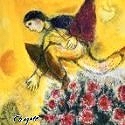
12.17.18 (Tevet 9, 5779) Every human culture engages in the art of storytelling to explain its origin, its values, and its destiny. Ancient myths, fables, and folklore were devised to serve that purpose, as were various religious dramas, legends about saints, and other sagas. Since art imitates reality, however, this implies that people everywhere intuitively understand that their individual roles find meaning in the context of a larger story of which they are part... In other words, people invariably tell stories because life itself is a great story, namely, God's story (i.e., His-story), and they sense a profound need to "find themselves" in the story line. Without an ultimate story about the meaning of life as revealed in the Scriptures, however, people are left to their own imaginations and will be unsure about who they really are, why they exist, and where they are inevitably going...
בַּעֲצָתְךָ תַנְחֵנִי
וְאַחַר כָּבוֹד תִּקָּחֵנִ
ba·a·tza·te·kha · tan·chei·ni
ve·a·char · ka·vod · tik·ka·chei·ni

"You guide me with Your counsel,
and afterward You will receive me to glory" (Psalm 73:24)

Since people need to find the meaning of life in order to cope with the chaos, suffering, and apparent pointlessness of this world, they invent stories to help them find some provisional comfort. However, the story we tell ourselves - namely, where we come from, who we are, and where we are ultimately going, has profound yet very practical consequences for the development of our inner character. For instance, to instill courage we must find meaning in suffering, but that implies that we see our personal suffering as part of a larger story. Even the pagan philosopher Nietzsche said that he could withstand any "how" in life as long as he had a "why," or a reason. The heart of faith takes this a step further, however, as when the Berditchev Rebbe prayed, "O God, I don't ask you to tell me why I suffer, but only whether I suffer for Your sake." If we fail to find any real purpose for our lives, or if we are unable to believe there is a "cosmic story" behind all things, namely, God's own story, then we will surely lose heart, because the suffering we experience will seem irredeemably pointless... Indeed, secular people today are notable for their practiced heartlessness (i.e., cowardice) because they refuse to see their lives as part of God's great redemptive story. In the intellectual wasteland of the postmodern age, there is no grand narrative we can tell ourselves, there is no objective truth about what is objectively right or wrong, and there is no personal God that directs the history of the universe toward an end. Because of this propaganda, secular people today have lost the ability to discern between good and evil, and therefore they are unable to see any real difference between righteousness and unrighteousness, between villains and heroes, and consequently they are devoid of moral fiber, ethical strength, and honor of soul. Contrary to the spirit of this age, as followers of Messiah we must be resolute regarding our identity as God's redeemed children. We are in the midst of a great spiritual war, called to fight the good fight of faith, and we will overcome the world by the blood of the lamb and the word of our testimony.
Dear friends, "after you have suffered a little while, the God of all Grace (אלהֵי כָל־הַחֶסֶד), who has called you to his eternal glory in the Messiah, will himself restore, confirm, strengthen, and establish you" (1 Pet. 5:10). "So let us not lose heart... For this light momentary affliction is preparing for us an eternal weight of glory beyond all comparison, as we look not to the things that are seen but to the things that are unseen. For the things that are seen are transient, but the things that are unseen are eternal" (2 Cor. 4:16-18). May God be the strength of your heart and your portion forever (Psalm 73:26).
To ask for the "meaning of life" is to ask for the means to life, that is, for the way to find its purpose and significance... According to the Torah of Yeshua, there is a supreme "end of life," an overarching reason for all things, a superlative purpose for the existence of the universe and all that is in it, and that purpose is revealed in the greatest story ever told, namely, the story of the glory of God and His redemptive love for us all. This is the true message of Christmas: "For God so loved the world, that he gave his only Son, that whoever believes in him should not perish but have eternal life" (John 3:16). Let's not miss the point of the story - that God chose to enter this space-time as "one of us" so that we could be touched by Him, healed by Him, saved by Him... That's the real miracle, and it's a real miracle for every day of our lives. Amen.
The Way of your Life...

12.16.18 (Tevet 8, 5779) The Hebrew word derekh (דֶּרֶךְ), often translated as "way," can refer to a physical road or pathway, but metaphorically it often refers to the journey, manner, or course of one's life. Everyone who is alive and conscious is "on the road," and every day presents us with choices about how we will walk down that road. If you are reading these words, you are presently on the way, and there is no escape from this journey you are on...
Walking a road implies decisions. You simply cannot walk anywhere without having a "where" or destination in mind (even the decision to be aimless is itself a decision). When we make decisions, consciously or not we are choosing what we believe will bring us nearer the goal or end or our journey. Along the way we will always encounter "forks in the road" – junctions where we must decide whether to turn to the left or the right, or to go backward in our journey. Such decisions are unavoidable, though many will choose to become victims of their own unreflective consciousness by choosing the path of "least resistance." People choose this path because they do not know "the end thereof" they walk…
So there is a way, or road, that you are walking, comprised of a (finite) series of choices you have made, are making, and will make, which are leading you somewhere. You cannot get off this road, and no one can walk it for you. Since this road represents the way of your life, you are ultimately responsible for how you choose to walk it. You are not free to choose the "what" of your journey (which is a brute fact), but you are free to choose its "how."
For more on this topic see: "Derekh HaYashar: Finding the Straight Way."
Vayechi - "And He Lived..."

[ Our Torah for this week is Parashat Vayechi, the final portion from the Book of Genesis, which includes Jacob's great prophecy of the coming Messiah... Happy Holidays! ]
12.16.18 (Tevet 8, 5779) Our Torah reading for this holiday week, parashat Vayechi (ויחי), recounts how the great patriarch Jacob adopted Joseph's two sons (Ephraim and Manasseh) as his own children. When Jacob blessed the boys, however, he intentionally reversed the birth order by putting the younger before the older, signifying that the old struggle he had faced as a child was over, and he now understood things differently. And note Ephraim and Manasseh's reaction: the older did not envy the younger, nor did the younger boast over the older. The family had apparently learned that blessing from God is for the good of all, and that there is no real blessing apart from genuine humility that esteems the welfare of others. Jacob was now ready to summon his family to hear his final words. Among other things, he foretold how the Messiah would come from the line of Judah and then instructed his sons to bury him only in the promised land, and not in Egypt (Gen. 49:10-12; 49:29-32).
After his death, Joseph and his brothers, with various dignitaries of Egypt, formed a funeral procession and returned to Canaan to bury Jacob in the Cave of Machpelah in Hebron. After the funeral, they returned to Egypt, but Joseph's brothers feared that he would now repay them for their former betrayal and threw themselves on his mercy. Joseph reassured them that they had no reason to fear him and reminded them that God had overruled their earlier intent by intending him to be a blessing to the whole world (Gen. 50:20).
The portion ends with the account of the death of Joseph, who made the sons of Israel promise to take his bones with them when the LORD would bring them back to the land of Canaan (alluding to the great Exodus to come). Joseph's faith in the Jewish people's return to the Promised Land is summarized by his statement: "God will surely remember you" (Gen. 50:24). He died at age 110, was embalmed and placed in a coffin in Egypt, full of faith that he would be raised from the dead in the land promised to Abraham, Isaac, and Jacob.
Note: This Shabbat we will finish reading the Book of Genesis (סֵפֶר בְּרֵאשִׁית) for the current Jewish year... This inestimably great book begins with an account of the creation of the universe by the LORD and ends with Joseph being put into a coffin in Egypt. Note that the word translated "coffin" is the Hebrew word aron (אֲרוֹן), a word used elsewhere in the Torah to refer exclusively to the Ark of the Covenant (the ark that Noah built and the ark that Moses was placed in are both called "teivah"). Throughout their desert wanderings after the Sinai revelation, the Israelites actually carried two special arks - one holding the bones of Joseph and the other holding the tablets of the Ten Commandments.
The Fear of the LORD...
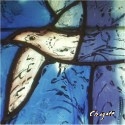
12.14.18 (Tevet 6, 5779) Some people are afraid that God will punish them for their sins, but the true fear of God, yirat shamayim (יִרְאָת שָׁמַיִם), is the tragedy of losing our closeness to Him... This is the fear of the Lord. The sages say that where it is written, "What does the LORD ask of you except to fear the LORD" (Deut. 10:12), we should read instead, "fear with the LORD" (לְיִרְאָה אֶת־יְהוָה), that is, we share his concern that we could forfeit the sanctity of a heart-relationship with Him due to carelessness and sin... We fear our sin because it blinds us from awareness of God's care and love. The fear of God can therefore be understood as God's fear that we will miss the blessing of intimately knowing him, and the consequence of losing that connection is the utmost tragedy...
The LORD has promised to never leave nor forsake us (Heb. 13:5), though we can choose to turn away from his love and care for our lives... We are not permitted to fear other than that we have no fear of God, for that indeed is a fearful state of soul. May it please God to help each us never to leave nor forsake ourselves by getting lost, by forgetting what is real, and by abandoning hope in the miracle for our lives... May the LORD help us not be grieved, not to hurt ourselves, and never to abandon our hearts to the despair of shame.
Passion and Truth....

12.14.18 (Tevet 6, 5779) Revelation is unknowable apart from passion... It is common enough to draw near to God with lips while the heart is far away from Him (Isa. 29:13). God doesn't care about your "religion" if your heart is withheld, nor is He impressed that you are a member of a particular denomination (i.e., the commandments of men). Spiritually speaking, the place of utmost danger is indifference toward God, and this danger constitutes the burden of a true prophet of God. "To listen (shema) is better than sacrifice... I desire love (chesed) and the knowledge of God (da'at Elohim) more than burnt offerings" (1 Sam. 15:22, Hos. 6:6). During the End of Days people will have a "form" (μόρφωσιν) of godliness but will deny its power, since their hearts will be obstinately turned away from the truth. "And because lawlessness (i.e., ἀνομία, lit. a=without; nomos=Torah) will be increased, the love of many will grow cold (Matt. 24:12). In this connection we note that the Hebrew word for "falsehood" (or "lie") is sheker (שֶׁקֶר), which can also be read as she-kar (שֶׁקַר), meaning "that which" (-שׁ) makes you cold (קַר). The truth of God can't be known apart from passion. What sort of a lover is he who is feckless or half-hearted in his devotion? Can you know the truth about true love without yearning, longing, and desire?
The Hebrew word for sin (i.e., chet: חֵטְא) means "missing the mark," though that essentially means missing the revelation of God's glory because lesser fears consume the heart and obscure passion of the truth... When we really see life as it is, we will be filled with awe over the glory of it all. "Fearing" (יִרְאָה) and "seeing" (רָאָה) will be linked and unified.
"There is much to drag us back, O Lord: empty pursuits, trivial pleasures, unworthy cares. There is much to frighten us away: pride that makes us reluctant to accept help; cowardice that recoils from sharing your suffering; anguish at the prospect of confessing our sins. But You are stronger than all these forces. We call you our Redeemer and Savior because you redeem us from our empty, trivial existence, you save us from our foolish fears. This is your work which you have completed and will continue to complete in us every moment." - Soren Kierkegaard (Journals)
Blessed Discontent...

12.14.18 (Tevet 6, 5779) "Love not the world, neither the things that are in the world. If any man love the world, the love of the Father is not in him" (1 John 2:15). The way of faith always represents collision with the world (κόσμος) and its philosophy of the "good life." Happy are those who "hunger and thirst" for righteousness, who refrain from this world and make themselves poor because of inner heartache. For them no amount of the world's pleasures can obscure the difference between what is and what ought to be... This world is at best a corridor to the world to come, a "valley of decision" about what we ultimately choose to believe and to love...The heart of faith looks forward to "the city that has foundations, whose designer and builder is God" (Heb. 11:10).
There is a great danger to become so assimilated into this world that there is no longer any collision, no longer any protest, but merely the whimper of the soul that begs to be left alone from the general toil and troubles of this age... Conscience is seared; natural affections have been abandoned; and the "life" of the soul becomes a mere cipher, a phantom, a ghost... This is the scheme of the worldly dialectic that traps the human soul into living and dying for the sake of sheer vanity. May God help us not to so waste our days... The core prayer of the godly soul is always, "Help me, O LORD my God! Save me according to your steadfast love" (Psalm 109:26). Empty our hearts from vanity, O LORD, and afflict us with hunger and thirst for You, for you alone are what we really need....
עָזְרֵנִי יְהוָה אֱלהָי
הוֹשִׁיעֵנִי כְחַסְדֶּךָ
oz·rei·ni · Adonai · E·lo·hai
ho·shi·ei·ni · khe·chas·de·kha

"Help me, O LORD my God!
Save me according to your steadfast love"
(Psalm 109:26)

Hebrew and Creation...

12.14.18 (Tevet 6, 5779) In Hebrew, the word for "word" is davar (דָּבַר), which also means "thing," suggesting a correspondence between divine speech (i.e., lashon hakodesh) and reality itself. By the power of the word, God "spoke" the universe into existence. Indeed the very first word of Scripture, bereshit (בְּרֵאשִׁית), often translated as "in the beginning," may be read as "by means of the first thing," where the "first thing" is the Hebrew alphabet itself. "Bereshit bara Elohim et..." therefore can be read, "by means of the Aleph-Tav (את) God created the heavens and the earth" (Gen. 1:1), implying that Aleph-Tav (i.e., the alphabet) precedes all created realms. However, we know that Yeshua is Word of God and the Aleph-Tav, the first and last (Rev. 22:13; Isa. 48:12), and therefore the verse can be read, "by means of Yeshua God created the heavens and the earth," which of course agrees with John 1:1-3 and Col. 1:16-17, "For by Him [Yeshua] all things were created..."
בְּרֵאשִׁית בָּרָא אֱלהִים אֵת
הַשָּׁמַיִם וְאֵת הָאָרֶץ
be·re·shit ba·ra E·lo·him et
ha·sha·ma·yim ve·et ha·a·retz

"In the beginning God created
the heavens and the earth."
(Gen. 1:1)

Hebrew Study Card
Note: Some of the sages connected the first Aleph-Tav (i.e., את) in Gen. 1:1 with the following letter Hey (ה) in the word ha-shamayim to form the word atah (אַתָּה), the Hebrew word for "you." This would then form, bereshit bara Elohim atah (בְּרֵאשִׁית בָּרָא אֱלהִ֑ים אֵתה) which could be interpreted as, "In the beginning God created you." And since the letter Hey represents the Holy Spirit in Jewish tradition, each time we say the word "atah" we connect all the Hebrew letters - from Aleph to Tav - with the Holy Spirit.
Depths of Surrender...

12.13.18 (Tevet 5, 5779) "For he that loses his life will find it..." (Luke 17:33). But how are we to understand this? An old story from the Desert Fathers comes to mind. A visitor came to the Master and was struck by his radiance. Later he spoke to a disciple and asked him for an explanation. The disciple quoted the Master's words, "Truly, truly, I say to you, unless a grain of wheat falls into the earth and dies, it remains alone; but if it dies, it bears much fruit" (John 12:24). Life is a sacred mystery, but death provides the key to unlock its meaning. We can "turn the key" by surrendering ourselves in silent expectation before God. Once we die to life in this world we are set free and empowered to live in joy and gratitude for everything. We experience serenity as we let go in surrender to God's care.
The first thing the life-giving Spirit says is that you must enter into death... You must first die to every merely earthly hope, to every merely human confidence; you must die to your selfishness..." (Kierkegaard: For Self Examination)
As Yeshua said: "Do not be anxious about tomorrow, for tomorrow will be anxious for itself. Sufficient for the day is its own trouble" (Matt. 6:34). Kierkegaard comments: "If there is no next day for you, then all earthly care is annihilated. When the next day comes, it loses its enchantment and its disquieting insecurity. If there is no next day for you, then either you are dying or you are one who by dying to temporality has grasped the Eternal, either one who is actually dying or one who is really living... The one who rows a boat turns his back to the goal toward which he is working. So it is with the next day. When, with the help of the Eternal, a person lives absorbed in today, he turns his back to the next day. The more he is eternally absorbed in today, the more decisively he turns his back to the next day." Amen. May God help us live for Him today, the day of salvation; today may we hear His voice.
שִׁירוּ לַיהוָה שִׁיר חָדָשׁ
שִׁירוּ לַיהוָה כָּל־הָאָרֶץ
שִׁירוּ לַיהוָה בָּרֲכוּ שְׁמוֹ
בַּשְּׂרוּ מִיּוֹם־לְיוֹם יְשׁוּעָתוֹ
shi·ru · ladonai · shir · cha·dash;
shi·ru · ladonai · kol ·ha·a·retz
shi·ru · ladonai · ba·ra·khu · she·mo;
ba·se·ru · mi·yom · le·yom · ye·shu·a·to

"Oh sing to the LORD a new song; sing to the LORD, all the earth!
Sing to the LORD, bless his Name; tell of his salvation from day to day."
(Psalm 96:1-2)

Hebrew Study Card
It is the saddest thing of all if a human being goes through life without discovering his need for God. Therefore blessed indeed are the poor in spirit, for theirs is the kingdom of heaven (Matt. 5:3). It is a "blessed fault" to understand our inner poverty, to know anguish of heart, and to be able to abide in God's salvation one day at a time....
Once upon a time there was a wood dove. It had its nest in the fearsome forest, where wonder and apprehension dwelt together, among the erect, lonely trees. But nearby, where the smoke rises up from the farmer's house, lived some tame doves. The wood dove would often meet a pair of these. He would sit on a branch that stretched out over the farmyard, not far from the two tame doves on the ridge of the roof. One day they were talking together about how things were going and about making a living. The wood dove said, "Up until now I have made my living by letting each day have its own troubles, and in that way I get through life just fine." The tame dove, not without preening itself, answered: "No, we manage differently; with us, that is with the rich farmer with whom we live, our future is secure. At harvest time, my mate and I sit up on the roof and watch. The farmer brings in so many loads of corn that I know we are secure for a very long time. We two are well provided for and have our guaranteed security."
When the wood dove returned home he pondered the matter. It occurred to him that it must be a great comfort to know that one's living was secure for a long time, and what a wretched thing it was to always live in uncertainty. "It would be best," he told himself, "to gather a great stockpile and store it here or there in some safe place."
The next morning the wood dove woke earlier than usual. He got to work right away and was so busy gathering and storing that he scarcely had time to eat. But as fate seemed to hang over him, every time he had collected a little supply and hidden it away, when he came to look for it, it was gone! Meanwhile there was no actual change about making a living. He found his food every day as before. And yet a great change had taken place. He did not suffer actual want, but he had acquired the anticipation of need in the future. His peace of mind was lost. He had become anxious about the necessities of life.
From now on, the wood dove began to worry. His feathers lost their glint of color, his flight lost buoyancy. He was no longer joyful; indeed, he was almost envious of the rich, tame doves. He found his food each day, ate his fill, and yet he was not satisfied. In worrying about his needs he had trapped himself in a snare in which no birdcatcher could have trapped him, trapped as only a free creature can trap himself. "This securing of the future is constantly on my mind," he said. "Oh why am I a poor wood dove and not one of those rich ones?"
He saw plainly that anxiety was taking its toll on him, and so he spoke seriously to himself, yet not so seriously that he could drive away the worry from his mind and set his heart at rest. No, he only spoke in such a way that he convinced himself that his care was justified. "I am not asking anything unreasonable or impossible," he said. "I do not ask to become like the wealthy farmer, but only like one of the rich doves."
Finally, he contrived a scheme. One day he flew over and sat between the tame doves on the ridge of the farmer's roof. He noticed a place where they flew in, so he flew in too, because surely the storeroom had to be there. But when the farmer came home in the evening and shut the dovecote, he discovered the strange dove. He immediately put it into a little box by itself until the next day, when it was killed and released from its worries about the necessities of life! Alas, the worried wood dove had not only trapped himself in worry but also in the dovecote to its death!
The wood dove is like us silly human beings. When a person is content with the dignity of being human, then he understands that his heavenly Father feeds him. This he learns from the birds of the air. He does not live like the tame birds in the house of the wealthy farmer, but in the house of him who is richer than everyone, for heaven and earth are the house and possession of God, and humankind is his guest.
A person must be content to be as he is; a dependent being, as little capable of sustaining himself as of creating himself. If we choose to forget God and look after our own sustenance, then we are overcome with anxiety. It is certainly praiseworthy and pleasing to God when a person works for his food. But if he forgets God, and thinks that he himself is supporting himself, then he becomes burdened with the necessities of life... Worry about making a living, or not making a living, is a snare. In actuality, it is the snare. No external power, no actual circumstance, can trap a person. If a person chooses to be his own providence, then he will go quite ingenuously into his own trap, the wealthy as well as the poor. If he wants to entrench himself in his own plot of ground that is not under God's care, then he is living, though he does not acknowledge it, in a prison. When the farmer shut the door on the wood dove, the wood dove believed himself to be safe, when in fact he was caught. Or to put it another way, he was shut out from the care of Providence and trapped in a life of anxiety. In a spiritual sense he made himself a captive "trapped himself unto death."
- Soren Kierkegaard: Upbuilding Discourses (1843); trans. Charles E. Moore
Good Eye of Faith...
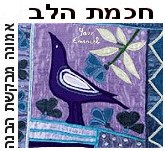
[ The following is related to this week's Torah reading, Parashat Vayigash... ]
12.13.18 (Tevet 5, 5779) Among other things, the story of Joseph reveals how God's hidden hand moves for good in our lives. Despite the terrible betrayal of the pit, and the unjust suffering of the prison house, there was light, exaltation, and joy to come forth. God knows how to take our emptiness to yield "storehouses in Egypt..." As Joseph later told his brothers, "you meant evil against me, but God meant it for good" (Gen. 50:20). Resist the temptation to judge by mere appearances. Forbid your sorrow to blind the eyes of faith. Do not unjustly judge God's purposes or try to understand His ways; accept that He works all things together (συνεργέω) for good -- making even the very wrath of man to praise Him...
Faith "sees what is invisible" (2 Cor. 4:18) and understands (i.e., accepts) that the "present form of this world is passing away" for purposes that are good (1 Cor. 7:31). It affirms that underlying the surface appearance of life (chayei sha'ah) is a deeper reality (chayei olam) that is ultimately real, abiding, and ultimately designed for God's redemptive love to be fully expressed. In this world we must "see through" a mirror (i.e., indirectly) to begin to see the dawn of our eternal home; but one day we will behold God panim el panim (פָּנִים אֶל־פָּנִים), "face to face" (1 Cor. 13:12). In the meantime, faith beholds the invisible light, the truth of God's love that overcomes all the powers of darkness, hate, and fear.... "I believe. I believe in the sun even when it is not shining; I believe in love even when feeling it not; and I believe in God, even when God is silent" (from an anonymous poem found on the wall of a cellar in Cologne, Germany, where some Jews hid from the Nazis).
"Faith in divine providence is the faith that nothing can prevent us from fulfilling the meaning of our existence. Providence does not mean a divine plan by which everything is predetermined, as in an efficient machine. Rather, providence means that there is a creative and saving possibility implied in every situation, which cannot be destroyed by any event. Providence means that the demonic and destructive forces within ourselves and our world can never have an unbreakable grasp upon us, and that the bind which connects us with the fulfilling love can never be disrupted." - Paul Tillich
For more on this important topic, see "Joseph and the Good Eye."
The Providential Prince...
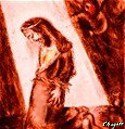
[ Our Torah reading for this week is parashat Vayigash... ]
12.12.18 (Tevet 4, 5779) Though Joseph was given great wisdom to interpret Pharaoh's dreams and to serve as Egypt's regent, his foresight did not prevent the famine from coming in the first place, and the testing that came was part of God's hidden plan. The role of the true prophet is to bear witness to God's truth and to shepherd God's people through the unfolding vision. Joseph could not control the outcome, though he worked within the context of revelation to bring about deliverance. In both the "fat times and the lean" we look to God for comfort and strength: We "show up" every day to ready ourselves for what is coming, even if we currently find ourselves in darkness. We refuse fear because we trust that the LORD our God is guiding our way...
The term hashgachah pratit (הַשְׁגָּחָה פְּרָטִית) refers to God's personal supervision of our lives (hashgachah means "supervision," and pratit means "individual" or "particular"). Since He is the Master of the Universe, God's supervision and providence reaches to the smallest of details of creation - from subatomic particles to the great motions of the cosmos. God not only calls each star by its own name (Psalm 147:4), but knows each particular wildflower and sparrow (Matt. 6:28-30, 10:29). Each person created in the likeness of God is therefore under the direct, personal supervision of God Himself -- whether that soul is conscious of that fact or not. As Yeshua said, even the hairs on your head are all numbered (Matt. 10:30). The God of Israel is also called אלהֵי הָרוּחת לְכָל־בָּשָׂר / Elohei ha-ruchot lekhol-basar: "The God of the spirits of all flesh" (Num. 16:22), and that means that he has providential purposes for every human being brought into this world (John 1:4).
Every Soul's Passion...

12.12.18 (Tevet 4, 5779) "Everybody wants to go to heaven, but nobody wants to die..." Everybody wants the finished product of a surrendered life, but no one wants the process, the painful shattering, the revelation of the end of themselves... And yet it is only by means of affliction that the "outer shell of the seed" is broken so that new life can burst forth: "I tell you the solemn truth, unless a kernel of wheat falls into the ground and dies, it remains by itself alone. But if it dies, it produces much grain" (John 12:24). If the seed does not fall to the ground and die, αὐτὸς μόνος μένει - it remains alone - by itself...
Since we will not surrender without struggle, God must intervene and save us from ourselves. Each of us must "go to Peniel" to wrestle with the Angel; each of us must be renamed from Ya'akov ("a supplanter") to Israel ("a prince with God"). Like Jacob, we will prevail with God when we give up the fight and accept our brokenness. We win by losing...
It's been said that we can never know that God is all we need until God is all we have left (John 15:5). Therefore "blessed are the poor in spirit, for theirs is the kingdom of heaven; blessed are those who mourn, for they shall be comforted; blessed are those who hunger and thirst for righteousness, for they shall be filled..."(Matt. 5:3-6).
טֶרֶם אֶעֱנֶה אֲנִי שׁגֵג
וְעַתָּה אִמְרָתְךָ שָׁמָרְתִּי
te'·rem · e·ei'·neh · a·nee · shoh·geig
ve·a·tah · eem·ra·te·kha · shah·mar'·tee

"Before I was afflicted I went astray,
but now I keep your word."
(Psalm 119:67)

The Kings of the Earth....
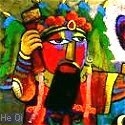
12.11.18 (Tevet 3, 5779) "When I thought how to understand this (i.e., the prosperity of the wicked), it seemed to me a wearisome task, until I went into the sanctuary of God; and then I discerned their end" (Psalm 73:16-17). We must remember that what man esteems and what God esteems are two very different things. Many questions are not answered by human reason but by coming before the Divine Presence, where the Spirit bestows assurances regarding the deeper purposes of God. Though the wicked seem at ease now, they abide in "slippery places" where their fall to ruin is certain. "Those who are far from You will perish; you destroy all who are unfaithful to you. But as for me, it is good to be near God. I have made the Sovereign Lord my refuge..." (Psalm 73)
וַאֲנִי תָמִיד עִמָּךְ אָחַזְתָּ בְּיַד־יְמִינִי
בַּעֲצָתְךָ תַנְחֵנִי וְאַחַר כָּבוֹד תִּקָּחֵנִי
מִי־לִי בַשָּׁמָיִם וְעִמְּךָ לא־חָפַצְתִּי בָאָרֶץ
va·ani · ta·mid · im·makh · a·chaz·ta · be·yad · ye·mi·ni
ba·a·tza·te·kha · tan·che·ni · ve·a·char · ka·vod · tik·ka·che·ni
mi · li · va·sha·ma·yim · ve·im·me·kha · lo · cha·fatz·ti · va·a·retz

"Nevertheless, I am continually with you; you hold my right hand.
You guide me with your counsel, and afterward you will receive me to glory.
Whom have I in heaven but you? And there is nothing on earth
that I desire besides you." (Psalm 73:23-25)

Of this evil world it is written, "Why do the people rage and the nations devise schemes that will fail? The kings of the earth set themselves, and the rulers take counsel together, against the LORD and against his Mashiach, saying, 'Let us tear off the shackles of their yoke, and throw off their ropes from us!' But the enthroned LORD laughs at their insolence and holds them in derision, until the appointed hour when He will speak to them in his wrath and terrify them in his fury" (Psalm 2:1-5).
The LORD God Almighty will surely break the pride of the "kings of the earth" with a rod of iron and dash them in pieces like a potter's vessel, and the shattering will be so severe that among its fragments not a shard will be found with which to take fire from the hearth, or to dip up water out of the cistern (Psalm 2:9; Isa. 30:14). For from His mouth comes a sharp sword with which to strike down the nations, and He will rule them with a rod of iron. He will tread the winepress of the fury of the wrath of God the Almighty (Rev. 19:15). "As you looked, a stone was cut out by no human hand, and it struck the image on its feet of iron and clay, breaking them in pieces. Then the iron, the clay, the bronze, the silver, and the gold, all together were broken in pieces, and became like the chaff of the summer threshing floors; and the wind carried them away, so that not a trace of them could be found. But the stone that struck the image became a great mountain and filled the whole earth" (Dan. 2:34-35). "And the God of heaven will set up a kingdom that shall never be destroyed ... and it shall stand forever" (Dan. 2:44). One day the edifice of man's godless pride will come crashing down, and there will be no trace left of its rubble...
Trust in Dark Hours...

12.11.18 (Tevet 3, 5779) "Let him who walks in darkness and has no light trust in the Name of the LORD (יִבְטַח בְּשֵׁם יְהוָה) and lean upon on his God" (Isa. 50:10). Spiritual darkness is permitted by God for his own sovereign purposes, perhaps as a means to teach us to abandon ourselves to his care. Trusting in God (i.e., bittachon - בִּטָּחוֹן) does not mean that we are obligated to affirm that this is "the best of all possible worlds," though it does mean we believe that eventually God will wipe away every tear and make all things right. Bittachon is a word for this world, which says, "Though he slay me, I will trust in him..." We do not need to trust for what is seen in this world but for an unseen good (Rom. 8:24). Those who call upon the LORD can trust not only in concealed good behind ambiguous appearances ("all things work together for good") but also in a future, real, substantive good that will one day be clearly manifest for us all... We fight the "good fight" of faith, which is a worthy struggle that eventually is realized for blessing. Meanwhile, we pray to God to be kept from such depth of sorrow that leads to sickness, darkness and despair.
מִי בָכֶם יְרֵא יְהוָה שׁמֵעַ בְּקוֹל עַבְדּוֹ
אֲשֶׁר הָלַךְ חֲשֵׁכִים וְאֵין נגַהּ לוֹ
יִבְטַח בְּשֵׁם יְהוָה וְיִשָּׁעֵן בֵּאלהָיו
mee · va·khem · ye·rei · Adonai · sho·mei·a · be·kol · av·do?
a·sher · ha·lakh · cha·she·kheem · ve·ein · no·gah · lo?
yeev·tach · be·Shem · Adonai · ve·yee·sha·ein · be·lo·hav

"Who among you fears the LORD and obeys the voice of his Servant?
Let him who walks in darkness and has no light
trust in the Name of the LORD and lean upon on his God."
(Isa. 50:10)
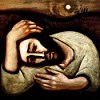
Hebrew Study Card
If you ask for bread, your heavenly Father will not give you a stone... Only God can deliver us from our "disordered loves" to take hold of what is truly essential. All we can do is ask, and keep on asking - even as we struggle on, despite ourselves, despite our losses... And we often revisit our sins over and over until we become "sick of our sickness," that is, until we begin to understand what our heart really needs. It's as if we are constantly being asked, "Is this what you want?" and our choices confess the truth... Only God does the miracle of real change within the human heart - only God can give life from the dead!
God's Providential Passion...

12.11.18 (Tevet 3, 5779) "The LORD will perfect that which concerns me: your love, O LORD, endures for ever: forsake not the works of your own hands" (Psalm 138:8). Here is the confession that all that we are or ever hope to be comes entirely from God, and therefore we can take heart. The LORD will finish the work he has begun in you: "Fear thou not, for I AM with you; be not dismayed, for I AM thy God; I will help you; yea, I will strengthen you, yea, I will uphold you with the right hand of my righteousness" (Isa. 40:10). Understand that the LORD's purposes are sure and his promises will invincibly be fulfilled, "for his lovingkindness is infinite" (כִּי לְעוֹלָם חַסְדּו). God will never forsake you nor abandon the work of his hands, but will providentially preserve his handiwork and consummate his vision of love (John 17:22; Eph. 1:10). Amen, "He who began a good work in you will bring it to completion for the Day of Yeshua the Messiah" (יוֹם יֵשׁוּעַ הַמָּשִׁיחַ, Phil. 1:6). "Now to him who is able to keep you from stumbling and to present you blameless before the presence of his glory with great joy, to the only wise God our Savior (μόνῳ σοφῷ θεῷ σωτῆρι ἡμῶν), be glory, majesty, dominion, and authority, before all time and now and forever. Amen" (Jude 1:24-25).
יְהוָה יִגְמר בַּעֲדִי
יְהוָה חַסְדְּךָ לְעוֹלָם
מַעֲשֵׂי יָדֶיךָ אַל־תֶּרֶף
Adonai · yig·mor · ba'adi
Adonai · chas·de·kha · le'olam
ma'a·sei · ya·de·kha · al-te·ref

"The LORD will perfect that which concerns me:
Your love, O LORD, endures forever:
forsake not the works of thine own hands"
(Psalm 138:8)

In our Torah for this week (i.e., Vayigash) we read: "God sent me before you to preserve you..." (Gen. 45:7). The mercy of God goes ahead of you to prepare a place for you (John 14:2). We may not know the details of our journey, but the "how" and the "way" is promised to us, as is our ultimate destination – the heavenly place of God, the Presence of our Beloved...
Birth Pangs and Deliverance....
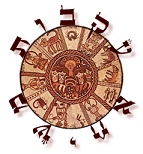
12.11.18 (Tevet 3, 5779) According to traditional Jewish sources (e.g., Pesachim 54b; Midrash Tehilim 9:2), no one knows the time when the Messiah will appear -- though there are some "signs" that indicate the nearness of the hour. Some of these signs include the rise of various false prophets, numerous wars and "rumors of wars" (including the rise of Magog), famines, earthquakes, worldwide apostasy from the faith, persecution, and a globalized sort of godlessness that is revealed in unbridled selfishness, greed, audacity, shamelessness, and a general lack of hakarat ha-tov (gratitude). People will become narcissistic and incapable of loving others. The greatest sign, however, will be that Israel will exist once again as a sovereign nation, despite the prophesied exile among the nations (Deut. 4:27-31; Jer. 30:1-3). The world will undergo various forms of tribulation, called chevlei Mashiach - the "birth pangs of the Messiah" (Sanhedrin 98a; Ketubot, Bereshit Rabbah 42:4, Matt. 24:8). These birth pangs are said to last for 70 years, with the last seven years as the most intense period of tribulation -- the "Time of Jacob's Trouble" / עֵת־צָרָה הִיא לְיַעֲקב (Jer. 30:7). The first wave of trouble came from Edom (i.e., "Rome/Europe") in the form of the Holocaust; the second is coming from Ishmael (i.e., the Arab states) in the form of the Arab-Israeli conflict. This accords with the teachings of Yeshua in the Olivet Discourse (Matt. 24-25). Concerning the tribulation that will come upon the earth before the final redemption takes place the sages comment: "If a pregnant woman goes into labor in the eighth month when her time is not yet come, they try to stop her labor, but not so in the ninth month. If the woman goes into labor then, they try to hasten it so that she may soon give birth. That is why formerly when people called to heaven begging God to free the earth some misery, their prayer was granted, for the time had not yet come. But now that redemption is near, no prayer that ascends on behalf of the sorrowful world is of avail, but sorrow is heaped upon sorrow, so that the birth may be accomplished" (Buber: Hasidim).
 |
For more see:
Truth, Reality and God...
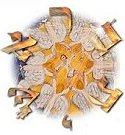
12.10.18 (Tevet 2, 5779) Can people really know that God exists and what God is like by means of reason? The Scriptures emphatically declare that indeed they can: "For the invisible things of God from the creation of the world are clearly seen, being understood (νοούμενα) by the things that are made, even the Eternal Power and Divinity; so that people are without excuse" (Rom. 1:20). The unseen is seen - discerned by the "eye" of logical inference - so that the phenomenal effect of the universe itself reveals intelligent design and divine agency. Moreover, since it is impossible to traverse an infinite number of causal connections to arrive at a present effect, people may rationally know that the universe itself is not eternal but has a determinate beginning as well. However, an even greater witness to the reality of God is found within the intuitions of the human heart. Intuitively we have an impression or idea of the "Supreme Being," that is, a being than which no greater can be conceived (Eccl. 3:11). Now if this idea were merely a fantasy, however, it would be possible to conceive of something greater, namely the reality of the Supreme Being, and therefore, since something that exists is greater than something merely imaginary, the Supreme Being necessarily exists. This "ontological" argument turns on the question of whether the idea of existence should be regarded as a "predicate" or "quality" that can be ascribed to something, though it seems clear it can, since we regularly distinguish between the real verses the illusory, between truth and fiction, and so on. Are such everyday distinctions valid when applied to the concept of God, however? Yes of course. Those who knowingly trifle with the meaning of what the word "is" is are prevaricators who seek to undermine meaningful linguistic and logical connections that allow us to navigate and interpret our experiences. In light of the foregoing, then, it is evident that we indeed know the universe had a beginning and that the Source of the universe is the Supreme Being who is One (there can only be one "Supreme" being, after all), who is also all-powerful, all-knowing, all-loving, morally perfect, personal and fully conscious, entirely holy (i.e., one of a kind and unique), and so on. These superlative attributes (or "predicates") logically follow and are maximally present from the logical realization of what a "Supreme Being" must be like. For instance, a Supreme Being must logically be present (i.e., "exist") in all possible worlds, since there can be no logically possible world where there is no source or agency that does not provide the conditions for that world to exist. Likewise, a Supreme Being must be all-knowing, since any deficiency in knowledge would designate a being less than the Supreme Being, that is, the One than which no greater may be conceived...
The secular "world" has its own religious mythologies, of course. For instance, the paradigms of western science have gone through various refining transformations or "shifts" over the centuries, and today the prevailing myth is that the universe is the effect of a cosmologically unknown (though supposedly) transcendental event called the "big bang" -- "from which, and through which, and to which are all things..." If you dare to question this dogma today, or to inquire about the "first cause" of this inexplicably and primordially determinative beginning, however, contemporary agnostic cosmology is essentially silent, though its proponents often find their voice denying that a personal God is the Creator of all things. In light of this intolerance, then, the "world" offers nothing but the present moment and must despair over both the beginning and end for anything that exists – from the realm of subatomic particles to the motions of great heavenly bodies. There is no existentially relevant "telos" or goal for anything other than the sheer immediacy of the moment (i.e., "survival"), and any thought of transcendental beauty or goodness is regarded as an illusion. Nevertheless, if the universe is the effect of a power greater than itself, that power is the answer to the question of why there is something rather than nothing, and the next step is to inquire about the possibility of knowing anything about this transcendental power itself.
God created us so that we could discern truth about reality. The mind functions according to intuitive logical laws because it is made in the image and likeness of God Himself... God Himself is the Source of all logic, since He created reality and structured the world to be intelligible according to its laws. As it is written: "In the beginning was the Word (i.e., ὁ λόγος - the Logic), and the λόγος was with God, and the λόγος was God... All things were made by Him (כָּל־הַמַּעֲשִׂים נִהְיוּ עַל־יָדוֹ); and without him was not any thing made that was made" (John 1:1-3). The LORD created a world that exhibits order and great beauty. And since human beings were created b'tzelem Elohim (בְּצֶלֶם אֱלהִים), in the image of God, our thoughts (and the words used to formulate our thoughts) as well as our actions are likewise intended to exhibit order and beauty. As it is written in our Scriptures: "For the fruit of light is found in all that is good and right and true" (Eph. 5:9).
As a matter of perception and the interpretation of experience, it is important to remember that we do not directly see light but by means of the light; the light is the medium by which we receive revelation... The heart looks through the eye, and therefore how we choose to see is a spiritual decision: "If your eye is "single" (i.e., ἁπλοῦς, sincere, focused)," Yeshua said, "your whole body will be filled with light" (Matt. 6:22). When we see rightly, we behold the radiance of God shining within us, even in the midst of our everyday affairs. A grateful heart is awake to God's Presence in the little things of life, those small miracles and glories that constantly surround us.
כִּי־עִמְּךָ מְקוֹר חַיִּים
בְּאוֹרְךָ נִרְאֶה־אוֹר
kee · ee·me·kha · me·kohr · chai·yeem
be·ohr·kha · neer·eh - ohr

"For with You is the fountain of life;
in your light do we see light"
(Psalm 36:9)

Hebrew Study Card
"In Your light we see light..." When you enter a dark room with a lamp, the darkness flees and is overcome by the light. So also with prayer (i.e., teshuvah): When we turn to the Lord, spiritual darkness is overcome by the Divine Radiance. In Yeshua is life, who is the light of the world; all those who receive Him behold ohr ha'chayim (אוֹר הַחַיִּים) - the "light of life."
The Wounds of Faith...

12.10.18 (Tevet 2, 5779) We all naturally want relief from pain in our lives, though Julian of Norwich reminds us of three wounds that mark the life of the follower of Yeshua during their pilgrimage on this earth, namely: 1) the wound of sorrow for our sin; 2) the wound of compassion for the suffering of others; and 3) the wound of our heart's longing for God. Our heartache for God is the argument of our life, our communion and hope: "Whom have I in heaven but you? And there is nothing on earth that I desire besides you" (Psalm 73:25). This is the confession of our loneliness, that is, the painful awareness that what is most important is missing in our life... Such loneliness is a divine invitation, of sorts, since it comes from a holy desire to be with God, a thirst of the heart that can only be relieved at God's fountain of life.
כִּי־עִמְּךָ מְקוֹר חַיִּים
בְּאוֹרְךָ נִרְאֶה־אוֹר
kee · ee·me·kha · me·kohr · chai·yeem
be·ohr·kha · neer·eh - ohr

"For with You is the fountain of life;
in your light do we see light"
(Psalm 36:9)

Hebrew Study Card
The Disguised Egyptian...

[ The following is related to this week's Torah reading, Parashat Vayigash... ]
12.10.18 (Tevet 2, 5779) According to midrash (i.e., ancient Jewish commentary), just before Joseph revealed his true identity he turned to his brothers and said, "You told me that your brother Joseph died. Are you sure?" "Yes, we are sure; he's dead," the brothers replied. Joseph then became angry and said, "How can you lie? You sold him as a slave. I bought him myself and can call him right now." Joseph then turned and called out, "Joseph, son of Jacob, come here right now to speak to your brothers." Terrified, the brothers turned to see if Joseph was coming.... When Joseph then overheard his brothers contritely preparing to meet their forsaken brother and to humbly ask for his forgiveness, he then looked at them and said in a loud and solemn voice: "Who are you looking for? אֲנִי יוֹסֵף הַעוֹד אָבִי חָי - ani Yosef! ha'od avi chai? I am Joseph! Is my father still alive?" (Notice that Joseph revealed himself to his brothers using Hebrew speech as the token of his identity.) When he saw his brothers draw back in fear at his shocking disclosure, Joseph reassured them by saying, גְּשׁוּ־נָא אֵלַי - ge'shu na elai - "Please come near to me; come and see..."
On a pe'shat level (i.e., literal sense), when Joseph revealed his identity he was asking his brothers if his father Jacob was still physically alive (ani Yosef - ha'od avi chai: "I am Joseph; is my father still alive?"). This is puzzling, since in earlier encounters the brothers attested that Jacob was very much alive... On a sod level (i.e., in a mysterious sense), since Joseph is a picture of Yeshua (Mashiach ben Yosef), the question can be phrased, "I am Yeshua - is My father alive?," that is, do you now understand the righteousness of God the Father in raising me from the dead and promoting me to His right hand? Yeshua therefore evokes the confession of faith from the beloved Jewish people: "I am your brother Yeshua: do you now understand that My Father is alive?"
Note: For more on this fascinating topic, see "The Disguised Egyptian." Also consider the Purim pages and the relationship between "hiding" and "revealing" in our lives.
That which God fears...

12.09.18 (Tevet 1, 5779) In the Torah we read: "And now, Israel, what does the LORD your God require of you, but to fear the LORD your God..." (Deut. 10:12). Notice that "fear of the LORD," yirat Adonai (יִרְאַת יהוה), comes first and is what is required of you. The sages say that to fear the LORD means that your fear should be like God's fear. But what could God possibly fear, you ask? Only this: that you will turn away from his love. To fear God doesn't mean fearing his punishment as much as it means fearing that which breaches the relationship He desires with you. That is the wound of God's heart, and that is what God "fears." One of the greatest of sins is to forget who you really are: a beloved child of God. To fear the LORD means you understand how dear you are to His heart...
It is written that the fear of the LORD is "the beginning of wisdom (רֵאשִׁית חָכְמָה)," but it also the beginning of the inner experience of God's love... Without the fear of the LORD, you will walk in darkness and be unable to turn away from evil (Psalm 111:10; Prov. 1:7; 9:10; 10:27; 14:27, 15:33; 16:6); you will find yourself alone, in a place of sadness and vexation, of despair and inner pain. The Spirit of God's love plainly declares that "the fear of the LORD leads to life (יִרְאַת יְהוָה לְחַיִּים, lit. "is for life"), indicating that it is a healing passion:
יִרְאַת יְהוָה לְחַיִּים
וְשָׂבֵעַ יָלִין בַּל־יִפָּקֶד רָע
yi·rat · Adonai · le·cha·yim
ve·sa·ve·'a · ya·lin · bal · yip·pa·ked · ra

"The fear of the LORD leads to life
and the one who has it rests satisfied and is untouched by evil."
(Prov. 19:23)

Some people tend to get this backwards, or they may underestimate the seriousness of the issue. The problem is not that people sometimes sin and therefore risk being sent to hell, but rather that people are incorrigible sinners that presently exist in state of hell... Human nature is incurably sick; the wound of our mortality is indeed fatal (Jer. 17:9; Mark 7:21-23). As Yeshua taught, the way out of bondage to sinful human nature is through the miracle of spiritual rebirth (John 3:3-8; 8:44). When we accept God's love we are delivered from the guilt that justly condemns our souls (Col. 1:13). As it is says "Whoever believes in him is not condemned, but whoever does not believe is condemned already, because he has not believed in the name of the only Son of God" (John 3:18). In other words, unless you truly repent by accepting God's love, you risk an eternally loveless existence... It must be remembered that God does not want any one to perish but for all to be in loving relationship with Him (2 Peter 3:9). "God our Savior desires all people to be saved and to come to the knowledge of the truth" (1 Tim. 2:4). However, "hell is a room locked from the inside," and if you steadfastly refuse to be loved, God Himself will respect your decision...
All this resolves to a sober question about your spiritual identity... Do you believe you are a redeemed child of God? Are you spiritually reborn? Do you accept His love and deliverance, or do you make it conditional, based on your performance? This is not about mere ethics, friends - the world is filled with various kinds of ethical philosophy, after all. No, this is a question about ontology - about who you really are; it's a question about what you are trusting, and it centers on the presence of the miracle within your heart.
We are saved by hope (Rom. 8:24). May you fall before the cross in fear of your sins, but may you be raised up by the reality of God's love for your soul... May you then walk in the awe of God's glorious mercy, "to love him, to serve the LORD your God with all your heart and with all your soul." Amen.
The Revelation of Joseph...

12.09.18 (Tevet 1, 5779) In our Torah portion this week, parashat Vayigash, Benjamin stood before Joseph accused of the theft of a chalice, while Judah "drew near" (vayigash) and vicariously offered to bear the penalty for his brother, pleading with Joseph to spare his father the loss of yet another son. Joseph was so moved by Judah's act of mesirat nefesh (self-sacrifice) that he decided the time had finally come for him to reveal his identity to his brothers. After clearing the room, he began speaking in Hebrew and said, אֲנִי יוֹסֵף הַעוֹד אָבִי חָי, "I am Joseph, is my father still alive?" When the brothers drew back in shock and dismay, Joseph said, "Draw near to me, please" (from the same verb nagash) and then explained how God providentially brought him to Egypt to save the family's life....
The revelation of Joseph and his reconciliation with his brothers is a prophetic picture of the acharit hayamim (end of days) when the Jewish people will come to understand that Yeshua is indeed the One seated at the right hand of the majesty on high as Israel's Deliverer. At that time Yeshua will speak comforting words to His long lost brothers and restore their place of blessing upon the earth. Indeed, the entire story of Joseph is rich in prophetic insight regarding our Lord and Savior. Vayigash (וַיִּגַּשׁ) means "and he drew near," referring first to Judah's intercession for the sins of his brothers, and then to Joseph's reciprocal desire for the brothers to draw near to him (Gen. 44:18, 45:4). Joseph initiated the reconciliation by saying, גְּשׁוּ־נָא אֵלַי / g'shu na elai - "Please draw near to me," and indeed there is a play on the verb nagash (נָגַשׁ), "draw near," throughout this story. Yeshua is depicted both in Judah's intercession (as the greater Son of Judah who interceded on behalf of the sins of Israel) and in Joseph's role as the exalted Savior of the Jewish people in time of tribulation. When Joseph disclosed himself and asked, "Is my father alive," we hear Yeshua evoking the confession of faith from the Jewish people: "I am Yeshua: do you now understand that My Father is alive?" Upon His coming revelation, all Israel will confess that indeed God the Father is "alive" and has vindicated the glory of His Son.
Rosh Chodesh Tevet...

12.09.18 (Tevet 1, 5779) Today is Rosh Chodesh Tevet, which marks the 10th month of the Torah's calendar (counting from the first month of Nisan). This was the fateful month that Nebuchadnezzar king of Babylon besieged Jerusalem before the Temple was destroyed in 586 BC (2 Kings 25:1; Jer. 39:1; Ezek. 24:1-2). The name of the tenth month is explicitly called Tevet (טֵבֵת) in the Scriptures (see Esther 2:16). Rosh Chodesh Tevet is sometimes observed as one day and sometimes as two, because the preceding month (Kislev) is sometimes "full" (consisting of 30 days) and sometimes deficient (consisting of only 29 days). With a two-day Rosh Chodesh, the first day is the 30th day of the preceding month (i.e., Kislev 30th), and its second day is the first day of the following month.
יְהִי רָצוֹן מִלְּפָנֵיךָ יהוה אֱלהֵינוּ וֵאלהֵי אֲבוֹתֵינוּ
שֶׁתְּחַדֵּשׁ עָלֵינוּ חדֶשׁ טוֹב בַּאֲדנֵינוּ יֵשׁוּעַ הַמָּשִׁיחַ אָמֵן
ye·hi · ra·tzon · mil·fa·ne·kha · Adonai · E·lo·hei·nu · ve·lo·hei · a·vo·tei·nu
she·te·cha·desh · a·lei·nu · cho·desh · tov · ba'a·do·nei·nu · Ye·shu·a · ha·ma·shi·ach · A·men

"May it be Your will, LORD our God and God of our fathers,
that you renew for us a good month in our Lord Yeshua the Messiah. Amen."
Hebrew Study Card

Messianic Jewish scholar Alfred Edersheim wrote that an early Aramaic source document called "The Scroll of Fasts" (i.e., Megillat Ta'anit: מְגִילַת תַעֲנִית), which included addtional commentary in medieval Hebrew (called scholium), may refer to the 9th of Tevet as the day of Yeshua's birth (i.e., sometime during late December in our Gregorian calendars). Note that Jewish history regards the month of Tevet to be one of national tragedy, marking the beginning of the destruction of the Holy Temple by Nebuchadnezzar, King of Babylon (in 587 BC). After the destruction of the Second Temple in 70 AD, the early sages might have associated the birth of Yeshua as yet another reason for mourning the loss of the Temple on this date. (For more about the controversial date of the birth of Yeshua, see the article, "Christmas: Was Jesus really born on December 25th?")
Tuesday, December 18th at sunrise is Asarah B'Tevet ("the Tenth of Tevet"), traditionally recognized as day of mourning for the loss of the Jewish Temple (Bet Ha-mikdash). Orthodox Jews will fast from sunrise to sunset to commemorate the siege of Jerusalem by Nebuchadnezzar, the King of Babylon (in 587 BC) -- an event that eventually led to the destruction of the First Temple and the 70-year Babylonian Exile of the Jewish people.
God's Overmastering Power...
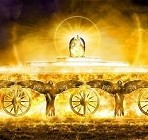
12.07.18 (Kislev 29, 5779) Though it might sometimes seem that evil has the upper hand in this fallen world, we must remember that the LORD God Almighty is in complete control and works all things together for our good - even overturning the schemes of the wicked for our ultimate benefit. The devil thought he had won a great victory when Yeshua died upon the cross, but God utterly vanquished his evil intent by raising Messiah from the dead and exalting Him as the matchless Ruler over all principalities, powers, and kings of earth (Rev 1:5). Ein od milvado (אֵין עוֹד מִלְבַדּו) - there is no power apart from God. Everything is in His hands, and He alone is the keyholder of hell and death (Rev. 1:18). "Hallelujah! For the Lord our God, the Almighty One, reigns." Therefore the LORD asks your anxious heart: "Behold, I AM the LORD, the God of all flesh. Is anything too difficult for me?"
הִנֵּה אֲנִי יְהוָה אֱלהֵי כָּל־בָּשָׂר
הֲמִמֶּנִּי יִפָּלֵא כָּל־דָּבָר
hin·neh · a·ni · Adonai · E·lo·hei · kol · ba·sar
ha·mi·me·ni · yi·pa·lei · kol · da·var

"Behold, I AM the God of all flesh
is there anything too difficult (or wonderful) for me?"
(Jer. 32:27)

Hebrew Study Card
As it is written in the psalms: "For the LORD Most High (יְהוָה עֶלְיוֹן, lit., "the ascended LORD") is to be feared; for He is the great king over all the earth" (Psalm 47:2). Amen!
The Struggle of Faith...
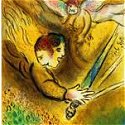
12.07.18 (Kislev 29, 5779) In the Torah it is written: "You shall not worship the LORD your God in that way" (Deut. 12:4), which referred to various Canaanite practices of idolatry based on mystery, ignorance and superstition. Unlike religious cults that were based on vain speculations, however, Jews are duty-bound to carry out God's will as expressed by the truth of divine revelation. Our father Abraham was given revelation of Torah (Gen. 26:5) and at Sinai moral truth was enshrined in the Ten Commandments (Exod. 24:12; Deut. 5:22). A basic assumption of Torah is that "ought implies can," or that we are genuinely responsible to know and to do moral truth. Unlike the ancient "mystery religions" that abandoned themselves by "celebrating" the lower nature, the Torah insists on overruling our base impulses and finding peace in the midst of the struggle to live in righteousness. Therefore we do not understand the Hebrew word "shalom" (שָׁלוֹם), or "peace," to simply mean the absence of strife, but rather "wholeness," "completeness," "healing" -- the integration of the heart and mind that comes through catharsis and personal struggle (Gen. 32:28). Faith does not mean passivity, but protest -- "arguing" for (and sometimes with) heaven, reminding God of his promises, lamenting over the divine absence; finding courage to oppose the status quo, and repeatedly appealing to heaven "be'khol levaveinu" (בְּכָל־לְבָבֵנוּ) -- with all our hearts -- precisely because we believe that our prayers can affect even the divine decrees... True faith confesses to "move mountains into the sea" (Mark 11:23) and refuses to let go of God until it receives the promised blessing to become "Israel" (Gen. 32:26).
Yeshua is the Light...
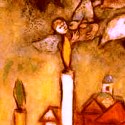
12.07.18 (Kislev 29, 5779) In the Gospel of John it is recorded that Yeshua said, "I am the way, the truth, and the life" (i.e., ᾽Εγώ εἰμι ἡ ὁδὸς καὶ ἡ ἀλήθεια καὶ ἡ ζωή). The Greek word translated "truth" in this verse is aletheia (ἀλήθεια), a compound word formed from an alpha prefix (α-) meaning "not," and lethei (λήθη), meaning "forgetfulness." (In Greek mythology, the "waters of Lethe" induced a state of oblivion or forgetfulness.) Truth is therefore a kind of "remembering" something forgotten, or a recollecting of what is essentially real. Etymologically, the word aletheia suggests that truth is also "unforgettable" (i.e., not lethei), that is, it has its own inherent and irresistible "witness" to reality. In that sense light is a metaphor for truth: "The light shines in the darkness, and the darkness has not overcome it" (John 1:5). People may lie to themselves, but ultimately truth has the final word.
Greek scholars note that the word lethei itself is derived from the verb lanthano (λανθάνω), which means "to be hidden," so the general idea is that a-letheia (i.e., truth) is non-concealment, non-hiddenness, or (put positively) revelation or disclosure. Thus the word of Yeshua - His message, logos (λόγος), revelation, and presence - is both "unforgettable" and irrepressible. Yeshua is the Unforgettable One that has been manifest as the express Word of God (דְּבַר הָאֱלהִים). Yeshua is the Light of the world (אוֹר הָעוֹלָם) and the one who gives us the "light of life" (John 8:12). Though God's message can be supressed by evil and darkened thinking, the truth is regarded as self-evident and full of intuitive validation (see Rom. 1:18-21).
The Hebrew word for truth (i.e., emet: אֱמֶת) comes from a verb (aman) that means to "support" or "make firm." There are a number of derived nouns that connote the sense of reliability or assurance (e.g., pillars of support). The noun emunah (i.e, אֱמוּנָה, "faithfulness" or "trustworthiness") comes from this root, as does the word for the "faithful ones" (אֱמוּנִים) who are "established" in God's way (Psalm 12:1). A play on words regarding truth occurs in the prophet Isaiah: אִם לא תַאֲמִינוּ כִּי לא תֵאָמֵנוּ / im lo ta'aminu, ki lo tei'amenu: "If you are not firm in faith, you will not be firm at all" (Isa. 7:9; see Faith Establishes the Sign). Without trust in the LORD, there is no stability... Truth is something trustworthy, reliable, firm, or sure. In colloquial English, for example, this idea is conveyed when we say, "He's a true friend...", indicating that the loyalty and love of the person is certain. The familiar word "amen" likewise comes from this root. Speaking the truth (dibbur emet) is considered foundational to moral life: "Speak the truth (דַּבְּרוּ אֱמֶת) to one another; render true and perfect justice in your gates" (Zech. 8:16). Yeshua repeatedly said, "Amen, Amen I say to you...." throughout his teaching ministry to stress the reliability and certainty of God's truth (Matt. 5:18, 26, etc.). Indeed, Yeshua is called "the Amen, the faithful and true witness" (Rev. 3:14).
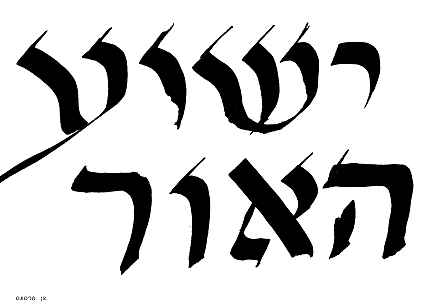 |
The relationship between the Hebrew and the Greek ideas seems to be that the revelation of God - the aletheia - is reliable and strong. The source for all truth in the universe is found in the Person and character of the God of Israel, blessed be He... The self-disclosure of the LORD is both unforgettable - both in the factual and moral sense - as well as entirely trustworthy. Aletheia implies that truth is something that should never be forgotten, and therefore we are regularly admonished not to "forget" the LORD (Deut. 8:11, Psalm 103:2), to "remember" his covenants, to "keep" his ways, to "guard" His precepts, and so on.
The Scriptures attest that Yeshua is the true Light (אוֹר אֱמֶת) that comes from eternity to give light and revelation for all mankind:
הָאוֹר הָאֲמִתִּי הַמֵּאִיר לְכָל־אָדָם
בָּא אֶל־הָעוֹלָם
ha'ohr · ha'amiti · ha'me'ir · lekhol · adam
ba · el · ha'olam

"[This is] the true light that shines to all men
who come into the world"
(John 1:9)
῏Ην τὸ φῶς τὸ ἀληθινόν, ὃ φωτίζει πάντα ἄνθρωπον
ἐρχόμενον εἰς τὸν κόσμον
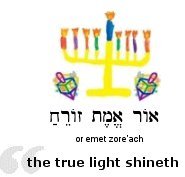
During this Chanukah Season -- and always -- may the LORD God of Israel help us walk in the unforgettable and irrepressible radiance of His glory. May God help us shine with good works that glorify God's Name (Matt. 5:16). "For God, who said, 'Let light shine out of darkness' (יְהִי אוֹר וַיְהִי־אוֹר), has shone in our hearts to give the light of the knowledge of the Glory of God in the face of Yeshua the Messiah" (2 Cor. 4:6).
כִּי־עִמְּךָ מְקוֹר חַיִּים
בְּאוֹרְךָ נִרְאֶה־אוֹר
ki · im·me·kha · me·kor · cha·yim
be·or·kha · nir·eh · ohr

"For with You is the fountain of life;
in Your light do we see Light"
(Psalm 36:9)
Chanukah 5779 Pictures (click for larger)
Left-to-right (top): 1. Emanuel; 2. Josiah lights the menorah; 3. Chanukah lights!; 4. Judah;
(bottom): 1. Chanukah lights; 2. Manny "lights" the menorah; 3. Olga and Manny; 4. enjoying the view
Remember the Future...
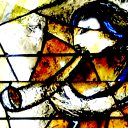
12.06.18 (Kislev 28, 5779) Yeshua forewarned of the alienation and moral sickness that would pervade mankind just before the time of his return: "Because lawlessness (i.e., ἀνομία, from -α ('not') + νομος, 'torah') will be increased," he said, "the love of many will grow cold (i.e., ψύχομαι, 'be extinguished')" (Matt. 24:12). Note the link between Torah and love: true love requires respect for God's authority, for without that the divine image is disfigured and desecrated. Likewise the Apostle Paul foresaw that the "End of Days" (אַחֲרִית הַיָּמִים) would be a time of peril (καιροὶ χαλεποί) because people would become increasingly narcissistic, self-absorbed, infatuated with their own sense of self-importance, abusive toward others, disrespectful to elders, ungrateful, heartless, unforgiving, without self-control, brutal, treacherous, and so on (2 Tim. 3:1-4). Therefore, in light of the spiritual war that rages all around us, it is vital that we remain firmly rooted in what is real by taking hold of our identity and provision as children of God. "God has not given us the spirit of fear, but of power (גְּבוּרָה / δύναμις) and of love (ἀγάπη), and of a "sound mind" (σωφρονισμός), i.e., a "delivered" mind -- centered and "healed" from inner chaos (2 Tim. 1:7). The name of the LORD (יהוה) means "Presence," and in Him "we live and move and have our being" (Acts 17:28). He is as close as our heart and our very breath (Rom. 10:8). We are not to be troubled like the world that lives in terror of man, nor are we to crave security from the vain devices of mere men. No - we must look to God Almighty, the Master of the Universe. He alone is our Refuge and Defense, the One who gives us steadfast love in the midst of these storms. "Let not your heart be troubled" - God is in control of the whirlwind, friends...
According to orthodox Jewish eschatological tradition, the period of time immediately before the Messiah's arrival is sometimes called ikvot meshicha (עִקְּבוֹת מְשִׁיחַ), the time when the "footsteps of the Messiah" can be heard. Some of the "signs" of this period include the rise of various false prophets, numerous wars and "rumors of wars" (including the rise of Magog), famines, earthquakes, worldwide apostasy from the faith, persecution, and a globalized sort of godlessness that is revealed in unbridled selfishness, greed, chutzpah (audacity), shamelessness, and a general lack of hakarat ha-tov (gratitude). The greatest sign, however, will be that Israel will exist once again as a sovereign nation, despite the prophesied exile among the nations (Deut. 4:27-31; Jer. 30:1-3). For more on this fascinating subect, see the article "Birth Pangs of Messiah."
Love's Great Humility...

12.06.18 (Kislev 28, 5779) "Unless you turn (shuv) and become like children, you will never (οὐ μὴ) enter the kingdom of heaven" (Matt. 18:3). Such is the importance of simple trust in God... Indeed Yeshua repeatedly taught us to trust God as "Abba," our Father (אַבָּא אָבִינוּ). He taught that we are warmly accepted as part of his family; that we are under his constant care; and that we live within his household as beloved children... And even though God is utterly transcendent, the Infinite One (אין סוף) and Creator of all worlds, he humbles himself to feed the birds of the air, to water lilies of the field, and to count the number of hairs on your head (Psalm 113:5-6). He is as close as your next breath; he leans upon your bosom at the table; he anticipates what you need before you ask him... The "fear of the Lord" is that you might fail knowing his great love for you -- that you will forget your true identity in lesser things. Therefore affirm the truth that you are loved with an unending and everlasting love, that you are safe, that you are surely accepted, and that nothing can ever separate you from the power of love. God your Father hears you, he knows you, and he loves you bekhol levavo (בְּכָל־לְבָבוֹ) - "with all his heart."
May we know God as our beloved Abba. "For you did not receive the spirit of slavery to fall back into fear, but you have received the Spirit of adoption by whom we cry, "Abba! Father!" The Spirit bears witness with our spirit that we are children of God, and if children, then heirs - heirs of God and fellow heirs with Messiah - even if we may suffer together with him to the end that we may also be glorified together with him" (Rom. 8:15-17). Amen...
Irrational Humanism...
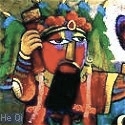
12.06.18 (Kislev 28, 5779) Skeptics often object to the existence of God because there appears to be so much gratuitous evil in the universe. They maintain that the three propositions: 1) God is all-loving; 2) God is all-powerful; and 3) evil exists; are semantically incompatible and therefore logically inconsistent. You can choose any two of the three propositions to believe, they pontificate, though you cannot consistently believe all three without becoming irrational. To avoid a lot of boring discussion about the unsoundness of this old argument, suffice it to say that it has long been shown that there is no logical contradiction by affirming all three propositions, and therefore the so-called "problem of evil" is not a deal-breaker for a rational person of faith. Because of this, the skeptic will then try a different approach by saying that while the existence of evil may not prove there is no Supreme Being, it nevertheless makes it "improbable" that such a being exists, and therefore the rational person will not believe in God as all-loving, all-powerful, etc. However, I want to point to a linguistic dilemma the skeptic encounters by arguing this way, since it is impossible to define "evil," "good," or to make the value claim that one state of affairs is "better" than another state of affairs without appealing to transcendental standards of goodness and justice. This fact demonstrates that many skeptics are parasites and abusers of religious language, pilfering metaphysical assumptions without providing any justification of their own. They can only complain about God and evil by assuming ideas that are derive from theological concepts of truth, justice, goodness, and so on. The skeptic needs to be told to back up and clarify their terms. They should not be allowed to smuggle in appeals to transcendental values in their attempt to say there are no transcendent values.
Have you ever heard someone utter the supposed axiom, "Everything is relative"? This is an example of sloppy and even absurd thinking, since if everything is relative, then the statement "everything is relative" is relative, which of course is a contradiction in terms. Did you know that Albert Einstein's famous "Theory of Relativity" was at first going to be called the "Theory of Invariance"? That's because the theory assumes the constancy of the speed of light to interpret states of energy/matter based on unchanging "laws" of physics (i.e., the measured velocity of light is the same (invariant) regardless of any relative motion). Don't be fooled by slick talkers who make a pretense of knowledge. If everything were relative, then nothing could be known, including the idea that anything is relative to another thing.
The Miketz Prophecies...
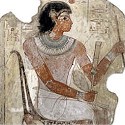
[ Our Torah reading for the Shabbat of Chanukah is parashat Miketz, i.e., Gen. 41:1-44:17. ]
12.06.18 (Kislev 28, 5779) Our Torah portion this week is called "Miketz" (מקץ), a word that means "at the end," and therefore it points to the prophetic future (i.e., the "end of days" or acharit ha-yamim). Just as Joseph was a "dreamer" who was betrayed by his brothers but was promoted to a place of glory by the hidden hand of God, so Yeshua was betrayed by his people yet was exalted over all the nations (מֶלֶךְ הַגּוֹיִם). And just as Joseph later disguised himself as a "stranger" and an "Egyptian" to his brothers but was finally revealed to be their savior, so will the Jewish people eventually come to see that Yeshua is the true Savior of Israel. Then will come true the hope of Rav Sha'ul (the Apostle Paul) who wrote, "And so all Israel shall be saved: as it is written, 'There shall come out of Zion the Redeemer (גּוֹאֵל) who shall turn away ungodliness from Jacob'" (Rom. 11:26).
For more on this important topic, see "Joseph and his brothers."
From Darkness to Light...
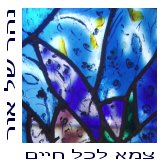
12.05.18 (Kislev 27, 5779) It is written in our Scriptures that the very purpose and goal of salvation is for us "to turn from darkness to light and from the power of Satan to God" (Acts 26:18). Hashivenu, Adonai... When the darkness seems to enshroud your way, pray for God's light to be rekindled within your soul. Keep faith that your gloom will soon pass, and that darkness and despair will not be your final end. Your mourning will find its comfort, your tears will be wiped away, and your grief will find its solace... Ask God to transform your heartache into the holy resolve to live and die for the truth of His great love.
Blessing for Darkness...

12.05.18 (Kislev 27, 5779) "If I say, surely darkness covers me ... the night shines as the day; nothing hides from your radiance" (Psalm 139:11-12). We have to trust that God is in our darkness, in the silence, in the unknown... God sees in your darkness and is present there, too. When you feel alone, when you feel abandoned, like an unbridgeable gulf lay between you and all that is good; when you feel like you want to scream but are afraid that even then no one would hear, may the LORD shine His light upon you...
גַּם־חשֶׁךְ לא־יַחְשִׁיךְ מִמֶּךָ
וְלַיְלָה כַּיּוֹם יָאִיר
כַּחֲשֵׁיכָה כָּאוֹרָה
gam · cho·shekh · lo · yach·shikh · mi·me·ka
ve·lai·lah · ka·yom · ya·ir
ka·cha·she·khah · ka·o·rah

"The darkness is not made dark to you;
but the night shines as the day:
as the darkness so is the light...
(Psalm 139:11)

Through the slough of despond and daily trials are forged for us insight and a greater grace still. Thank you for your prayers, friends...
Waking Up to the Light...
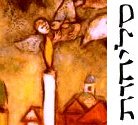
[ The following is related to the holiday of Chanukah... ]
12.04.18 (Kislev 26, 5779) Some people seem to sleepwalk through their days, without ever waking up... They miss life's wonder; they close their eyes to the Divine Presence; they shun asking the "big questions" because this disturbs their prejudices; indeed, they would rather be entertained, mesmerized, and rendered unconscious. Many people prefer to be put under a hypnotic spell than to be brought back to reality; they actually want their illusions and virtual lives! The first step of deliverance is to confess that we are asleep, and that we prefer sleep to opening our eyes to the truth. As it is written, "it is light that makes everything visible; therefore it says, "Awake, O sleeper, and arise from the dead, and the Messiah will shine on you" (Eph. 5:14). Arise and shine, for your light has come!
קוּמִי אוֹרִי כִּי בָא אוֹרֵךְ
וּכְבוֹד יְהוָה עָלַיִךְ זָרָח
ku·mi o·ri ki va or·rekh
ukh·vod Adonai a·la·yikh za·rach

"Arise, shine, for your light has come,
and the glory of the LORD has risen upon you."
(Isa. 60:1)

Hebrew Study Card
It is not easy to wake up, to rouse ourselves, to find focus, concentration, "kavanah," - and yet spiritually speaking it is essential. Hence Yeshua repeatedly asked his disciples: "Do you now believe?" May God have mercy upon us and help us arise to behold His glorious light!
Chanukah 5779 Pictures (click for larger)
Left-to-right (top): 1. Emanuel David; 2. Driedels; 3. John lights menorah; 4. our three sons;
(bottom): 1. Judah Avraham; 2. Olga and Josiah; 3. Manny's painting; 4. enjoying the lights!

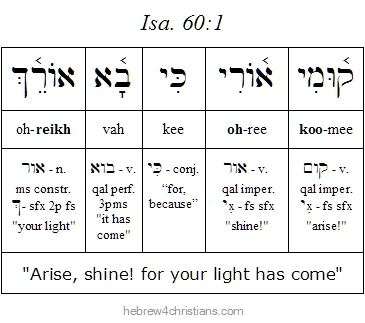
The Message of Chanukah...

12.04.18 (Kislev 26, 5779) The word chanukah (חֲנֻכָּה) means "dedication," a word that shares the same root as the Hebrew the word chinukh (חִנּוּךְ), meaning "education." Just as the Maccabees fought and died for the sake of Torah truth, so we must wage war within ourselves and break the stronghold of apathy and indifference that the present world system engenders (Rom. 12:2; Eph. 6:11-18). We must take time to educate ourselves by studying the Torah and New Testament, for by so doing we will be rededicated to the service of the truth and enabled to resist assimilation into the corrupt world. As it is written: "Love not the world, neither the things that are in the world..." (1 John 2:15).
During this time of year -- and especially during this dark hour of history near the prophesied "end of days" -- it is imperative to remember that we are in the midst of the great "war of the ages," where people's souls and destinies are at stake... This world is likened to the "Valley of Decision," the corridor to the world to come... We cannot afford to be indifferent to the darkness that continues to blind the eyes of so many people. We must take a stand for God's truth and be fully equipped to give an account for the hope we have in Yeshua. Ultimately the "cleansing of the Temple" is a matter of the heart, friends...
We are all called to "fight the good fight of faith" and to take hold of the eternal life given to us in Yeshua our LORD (1 Tim. 6:12). Among other things this means refusing to assimilate with the corrupt world system (Κόσμος) and forfeiting our identity in Yeshua.... Chanukah is a "fighting holiday" -- a call to resist the oppression of this world and to rededicate our lives entirely to God and his truth.... Indeed, of all the people in the world, Christians who love Yeshua should should understand the true meaning of Chanukah and to rejoice that the Yeshua our Messiah overcame this world.
For those who want some additional information about why Chanukah is so important, please see the article, "Let your light shine - Why Christians should celebrate Chanukah." I hope you will find it encouraging, chaverim.
כָּךְ יָאֵר נָא אוֹרְכֶם לִפְנֵי בְּנֵי אָדָם
לְמַעַן יִרְאוּ אֶת מַעֲשֵׂיכֶם הַטּוֹבִים
וִיכַבְּדוּ אֶת־אֲבִיכֶם שֶׁבַּשָׁמָיִם
kakh · ya·er · na · o·re·khem · lif·nei · be·nei · a·dam
le·ma·an · yir·u · et · ma·a·se·khem · hat·to·vim
vi·kha·be·du · et · a·vi·khem · she·ba·sha·ma·yim

"Let your light so shine before men,
that they may see your good works,
and glorify your Father in heaven"
(Matt. 5:16)
Οὕτως λαμψάτω τὸ φῶς ὑμῶν ἔμπροσθεν τῶν ἀνθρώπων,
ὅπως ἴδωσιν ὑμῶν τὰ καλὰ ἔργα,
καὶ δοξάσωσιν τὸν πατέρα ὑμῶν τὸν ἐν τοῖς οὐρανοῖς

Let your light shine, friend... And "may the God of hope (אלהֵי הַתִּקְוָה) fill you with all joy and peace in believing (שִׂמְחָה וְשָׁלוֹם בָּאֱמוּנָה), so that by the power of the Holy Spirit (עז רוּחַ הַקּדֶשׁ) you may abound in hope" (Rom. 15:13). May you be filled with the light of hope. Chag Urim Same'ach - "Happy Festival of Lights!"
The Source of Light...
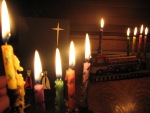
12.04.18 (Kislev 26, 5779) "God is Light; in Him there is no darkness at all" (1 John 1:5). Yeshua said: "I AM come a light into the world, that whoever believes in me should not abide in darkness" (John 12:46). The ultimate message of Chanukah is eschatological and full of hope. This world is passing away and the Kingdom of Heaven will one day be established upon the earth. We live in light of this blessed hope (Titus 2:11-13). The world's rulers are "on notice" from God Almighty: their days are numbered and they will surely face the judgment of the LORD God of Israel (Psalm 2). We must stand against evil by refusing to conform to the world around us (Eph. 6:11-18). Now is the time. "Let your light so shine before others that they may see your good works and give glory to your Father who is in heaven" (Matt. 5:16). Followers of Yeshua are made part of His Dwelling - extensions of His Presence in this dark world - and during this Chanukah season may we remember the call to rededicate our lives to Him! May your light shine!
Hearing the Father's Voice...
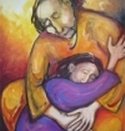
12.03.18 (Kislev 25, 5779) "Dear child of mine, do not forget my Torah (תּוֹרָתִי), but let your heart keep my commandments (מִצְוֹתַי). Doing so will add to you length of days, (ארֶךְ יָמִים), long life, and peace (שָׁלוֹם). Do not abandon the heart of Your Father by losing sight of mercy and truth (חֶסֶד וֶאֱמֶת); no! Tie them around your neck; inscribe them upon the table of your heart (לוּחַ לִבֶּךָ), that is, make them part of your inner being and will. Doing so will reveal my grace (חֵן) and good understanding (שֵׂכֶל־טוֹב) before the eyes of God and others. Trust in your heavenly Father with all your heart (בְּטַח אֶל־יְהוָה בְּכָל־לִבֶּךָ) and don't seek to be in control, trying to figure everything out on your own (וְאֶל־בִּינָתְךָ אַל־תִּשָּׁעֵן). Listen for your Father's voice in everything you do; in all your ways know His heart (בְּכָל־דְּרָכֶיךָ דָעֵהוּ), and then your ways will be directed in the truth. Don't assume that you know it all; abandon your self-conceit: Revere your heavenly Father (יְרָא יְהוָה) and flee from what you know is self-destructive and evil! Doing so will impart healing (רִפְאוּת) to you: your body will glow with health, your very bones will vibrate with life! Honor your Heavenly Father with everything you own; give him your first and the best of what you have (מֵרֵאשִׁית כָּל־תְּבוּאָתֶךָ); then your barns will burst with plenty, and your wine vats will be overflowing" (Prov. 3:1-10).
Parashat Miketz - מקץ

[ The eight days of Chanukah run from Sun Dec. 2nd (i.e., Kislev 25) through Mon. Dec. 10th this year. The weekly Torah reading is not suspended for Chanukah (as it is for Passover and Sukkot), though additional Torah readings are read for each of the eight days of the holiday... ]
12.02.18 (Kislev 24, 5779) In our Torah portion for Chanukah week, we will read how Joseph successfully interpreted Pharaoh's dreams and rose to power in Egypt. Because of a famine in the land of Canaan, however, his brothers came to Egypt in search of food. A disguised Joseph then tested his brothers to see whether they were the same people who had callously sold him into slavery, or whether they had undergone teshuvah (repentance).
The eventual revelation of Joseph and his reconciliation with his brothers is a prophetic picture of acharit ha-yamim (the "End of Days") when Israel, in Great Tribulation, will come to accept Yeshua as Israel's true deliverer. Presently, the veil is still over the eyes of the Jewish people and they collectively regard Yeshua as an "Egyptian" of sorts. In this connection, I list some of the ways that Joseph is a "type" or foreshadowing of the coming Yeshua as the Suffering Servant (see "Mashiach ben Yosef").
Note: This year the eight days of Chanukah begin on Sunday, December 2nd at sundown (1st candle) and will run through Monday, Dec. 10th until sundown. The tradition is that on the first night of Chanukah one flame is lit, on the second night two, and so on until the eighth night when eight flames are lit. In this way we remember the 'growth' of the miracle. We also read a small section of Torah for each of the days of Chanukah.
H4C Chanukah Resources...

[ The eight-day Festival of Chanukah begins at sundown tonight this year... ]
12.02.18 (Kislev 24, 5779) The Chanukah Blessings page includes some free "Hebrew Study Cards" you can use for your Chanukah celebrations. Each card includes the Hebrew text, phonetic transliteration, and English translation for the blessing. In addition I have recorded Hebrew audio clips for the Chanukah blessings as well, so you can listen to the Hebrew as your learn to recite the blessings... I have also created a handy one page summary of the Hebrew blessings you can download here. I hope you find this material helpful, chaverim! Chag Chanukah Sameach (חַג חֲנֻכָּה שָׂמֵחַ)!
|



